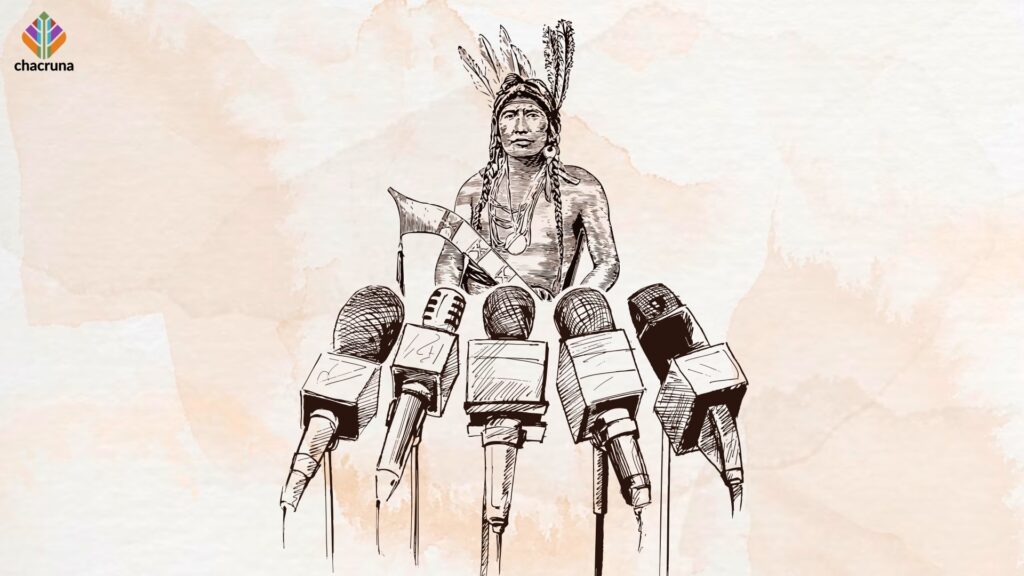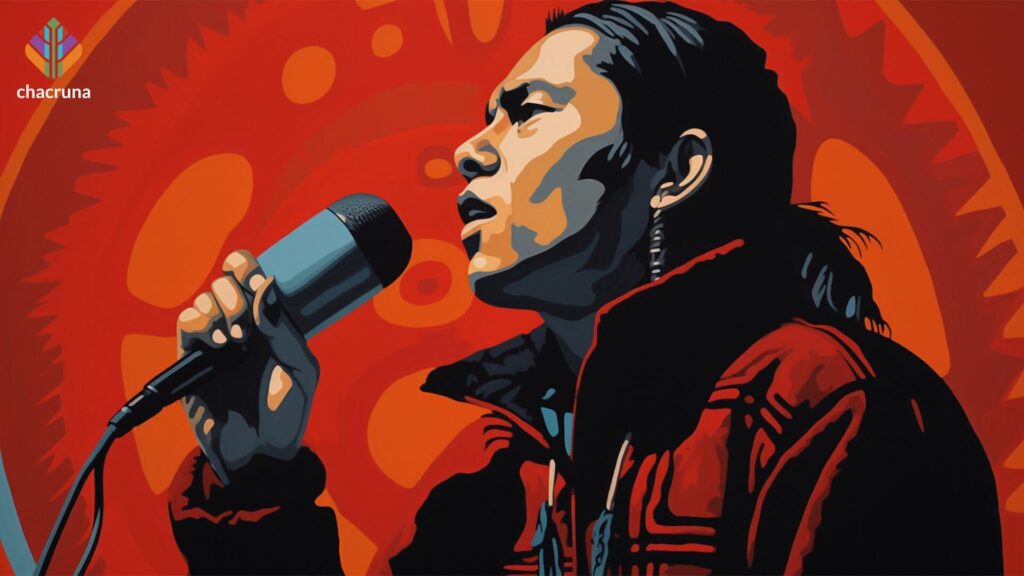
Chacruna Institute’s Resources
As the use of psychedelics continues to thrive in the mainstream, we continue to see the voices of Indigenous communities, who have used these plant medicines for millennia. Since its founding, Chacruna Institute has been committed to providing a platform for Indigenous communities to share their traditions and history, as well voice their concerns about this growing movement, and the challenges that they have and continue to face. This extensive list of resources includes dialogues with and by Indigenous people on various important topics pertaining to their communities, cultures, and livelihoods. These resources come in the conferences we have held, in-person community dialogues, and virtual community forums we have put together, and articles that we have published in the Chacruna Chronicles.
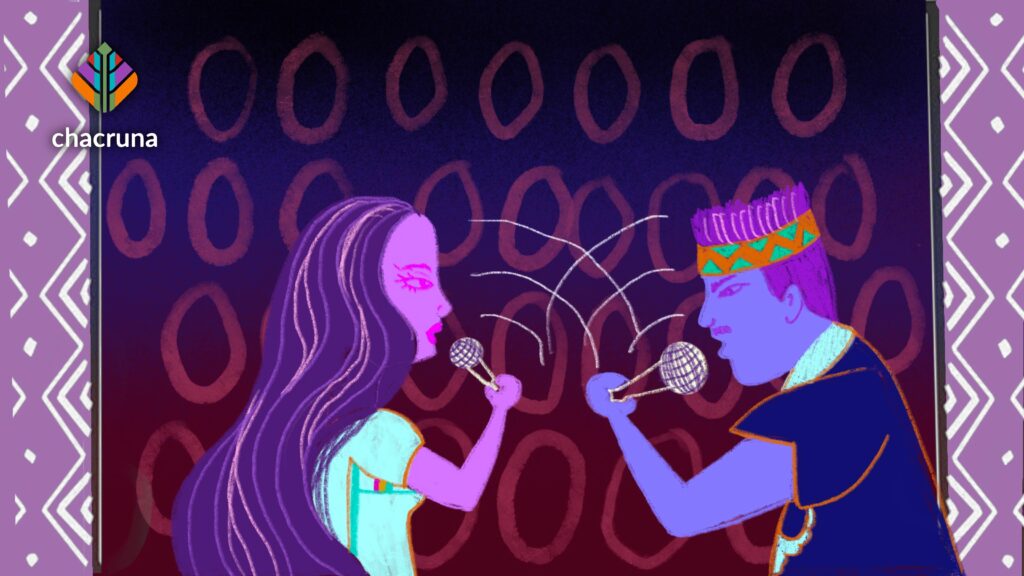
I. VIRTUAL COMMUNITY FORUMS
When Cultural Appropriation Becomes Cultural Extermination
November 11th, 2020
A Conversation with Miguel Evanjuanoy Chindoy and Riccardo Vitale
Translated by Diana Negrín. Supporting indigenous community health and cultural survival through the defense of traditional medicine and spirituality.
In 2009, the Colombian Constitutional Court declared 34 out of the 102 indigenous peoples of Colombia “at risk of cultural and physical extermination.” Some of these peoples partake in the ceremonial use of yagé (ayahuasca). Through the relentless appropriation (extraction and exploitation) of material and immaterial resources from the Amazonian territories, we are losing precious ancestral and resilient knowledge and putting vital ecosystems at risk.
As part of the Colombian indigenous resistance movement, the leaders of the Union of Indigenous Yagé Medics of the Colombian Amazon (UMIYAC) have been taking action to deter this annihilating process. Founded in 1999 and including five indigenous groups from the Colombian Amazon, UMIYAC has fought to preserve the rainforest and to revitalize and protect these cultures and their ancestral medicine.
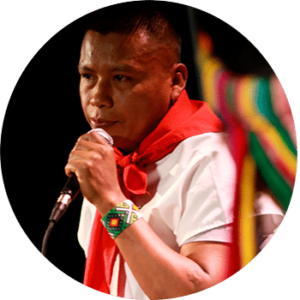
Miguel Evanjuanoy Chindoy, environmental engineer, member of the Inga people, community leader and follower of yagé spirituality since his childhood years. He lives in Putumayo, Colombia. Miguel is an indigenous rights’ activist and a spokesperson for the Union of Indigenous Yage Medics of the Colombian Amazon (UMIYAC). His work includes building bridges between knowledge systems to strengthen the territorial and political autonomy of Amazonian indigenous peoples. He also focuses on key issues such as: the role that indigenous spirituality and yagé medicine play in indigenous governance, indigenous mental health, peacebuilding and reconciliation in war-torn Colombia. Recently he has been researching and raising conscience about the devastating effects of cultural appropriation of spiritual practices on Amazonian communities. He leads UMIYAC’s technical committee.
Psychedelics & Native American Heritage Month
November 25, 2020
Demonization of psychedelics is connected to a long history of the colonization and oppression of Native cultures. Powerful tactics used by systemic structures of colonization is to strip away the cultural influences from the medical benefits of psychedelics, which has influenced our misunderstanding of them today. After hundreds of years, modern society is just beginning to reevaluate the stigmas taught about psychedelics, where, and who they come from. In November 2020, Sutton King, MPH Indigenous health advocate, researcher, and social entrepreneur joined Dr. Bia Labate, Chacruna’s Executive Director, for an enlightened dialogue on psychedelics and Native American Heritage Month. Co-Founder of both the Urban Indigenous Collective and Shocktalk, she shared what “Native American Heritage Month” means, and discussed the reeducation that is needed to decolonize our societal thinking, the healthcare system, its data, and why Native voices have been silenced in the healthcare and science industry. Stewarding plant medicine in a good way is reliant on Indigenous communities, and we should seek to consult, co-create with Indigenous peoples, and dismantle the current colonial structures.

Sutton King, MPH, Afro-Indigenous of the Menominee and Oneida Nation of Wisconsin. She is an Indigenous Health Advocate, Researcher and Social Entrepreneur dedicated to developing and scaling innovative solutions to improve Indigenous health equity across sectors. Her focuses center decolonial approaches and culturally appropriate methodologies within technology, healthcare and business. She supports research to increase the visibility surrounding Indigenous health outcomes and access to mental health care for Urban Natives through her roles as President and Executive Director of the Urban Indigenous Collective a grassroots organization dedicated the health and wellbeing of Urban Natives and Co-Founder of ShockTalk a telebehavioral application connecting Native users to Native therapists. She is the Chief Impact Officer for Journey Colab, a biotech company decolonizing their approach to drug development. In her role as Chief Impact Officer for Journey Colab she supports the design and implementation of a stakeholder model and ensures social impact through company accountability.
Chacruna in Canada: What Does Reciprocity Look Like in the North
January 20, 2021
In 2020, Health Canada created a small number of exemptions for the use of psychedelic medicines, and officially opened the doors to a renewed set of conversations about the place of psychedelic plant medicines. Canada has a proud tradition of innovations in publicly funded health care, but a more troubled relationship with its colonial past. Psychedelic plants have been caught in different traditions, borrowing from practices of western science but also honouring traditions, rituals, and ways of knowing plants and healing traditions that were prohibited through successive Indian Acts. Canada is not known for its organic psychedelic plant medicines, but has its own rich and diverse history of plant medicines and teachings that raise cultural, philosophical, and economic questions about what it means to decriminalize psychedelics in Canada. In this discussion, we talked about what psychedelic plant medicines mean for Canada. We moved beyond policy questions to consider how psychedelic plant medicines involve deeper questions of reconciliation with Indigenous communities, and a new era of reciprocity, one that embraces shared ideas about health care objectives, spirituality in medicine, and diversity of perspectives involved in designing equitable health care options. We asked, “What can we learn from the South about psychedelics and about reciprocity?”
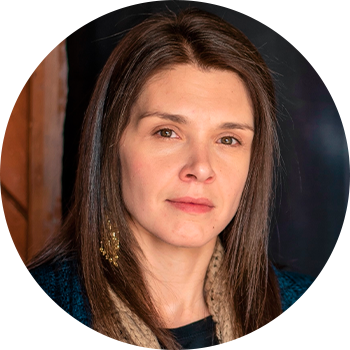
Jazmin Pirozek, MSc, is of Kinosao Sipi, Norway House Cree Nation in Manitoba and lives in Kenora, Ontario. She is a student of Maestro Juan Flores, a Plant Medicine Teacher of the Peruvian Amazon. Jazmin has received her master’s degree in Biology, focussing on Boreal Forest Ethnobotany, as well, she is a graduate of Boreal Forest Archaeology and Cultural Anthropology. Jazmin has travelled across Canada to share her knowledge, as well as to the United Kingdom to present at Breaking Convention 2019. She assisted in writing Science North’s Planetarium film “Under the Same Stars: Minwaadiziwin” including narration and singing for the piece. Jazmin shares her knowledge of Boreal forest medicines, continually working with the Indigenous people of Northern Ontario. Currently, Jazmin works as a consultant with a Tribal council and a Community Organization teaching knowledge that promotes well-being, healing and self-knowing.
Preservation of Ayahuasca Religious Freedom in America
March 3, 2021
For this panel from March 2021, Chacruna and members of the Church of the Eagle and the Condor (CEC) and their attorneys gathered in conversation about CEC’S Ayahuasca Religious Freedom Initiative. They addressed the current CEC crowdfunding campaign and clarified implications for other groups, transparency around the money raised, and potential concerns from the community. The discussion included seizures of ayahuasca by the Department of Homeland Security and the Church’s plan to investigate the seizures and request the return of their seized sacrament. The Church hopes to carve a path for other churches toward governmental recognition of the right to religious use of ayahuasca. Ultimately, the Church aims to secure a reliable and consistent precedent for churches that use ayahuasca sacramentally under the Religious Freedom Restoration Act. Watch this panel to learn: Who is the Church of the Eagle and the Condor? What are the issues? How will the funds help CEC and other Churches?
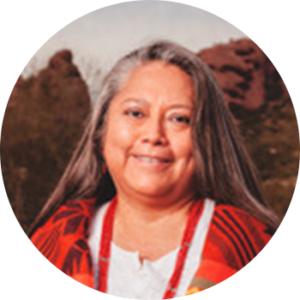
Belinda Eriacho is from the Diné (Navajo) and Ashwii (Zuni Pueblo) lineages. Her maternal clan is “One-Walks-Around” and she is born for the Zuni people. Belinda was born and raised on the Navajo reservation in Arizona. She holds degrees in Health Sciences, Public Health, and Technology. Belinda participated in the MDMA Therapy Training for Communities of Color in August, 2018. Belinda has journeyed through her own inner and physical healing to find her gifts as a Healer and Wisdom Keeper.
A Vine for the Soul: Yagé and Chagro in Colombia
June 30, 2021
The variety of ancestral plant medicine in Colombia is very diverse. Among the sacred plants Yagé is one of the most widely used plants for the treatment of physical and spiritual diseases and disorders. This event explored the tradition, history, and knowledge of this medicine and the benefits and implications of its ceremonial and therapeutic use. This event featured Taita Crispin Chindoy, native doctor, healer and anthropologist from the Kamentsa ethnic group of Alto Putumayo, as well as Xochi Bucuru, native doctor, health educator and communicator, dedicated to work with ethnic groups native to Colombia and South America. Through traditional knowledge and anthropology, they shared the importance of this sacred plant and traditions for the native people, and how its misuses have caused degraded images of these traditions. This presentation merged traditional anthropological language with the vision of medicine, where the true doctors and connoisseurs of this millenary science are promoted and valued.
Cultural Tras la Huella (CTH) is a nonprofit organization based in Colombia, that protects, shares and documents traditional knowledge, cultural and artistic, in support of personal and social development.
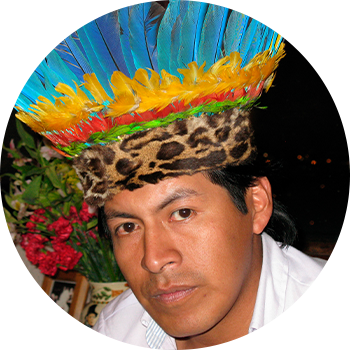
Taita Crispin Chindoy, miembro del Pueblo Indígena Camentsa del Valle de Sibundoy, Putumayo, Colombia. Estudiante de antropología de la Universidad Externado de Colombia, investigador sobre las plantas sagradas y culturales. Reconocido como autoridad tradicional para el ejercicio de la medicina por su comunidad. Ha tenido la oportunidad de realizar diferentes intercambios culturales para complementar sus estudios en otros países de América y Europa. Con interés en la defensa, reconocimiento y protección de los individuales y colectivos, como también por el fortalecimiento de la memoria histórica que sustentan los saberes ancestrales.
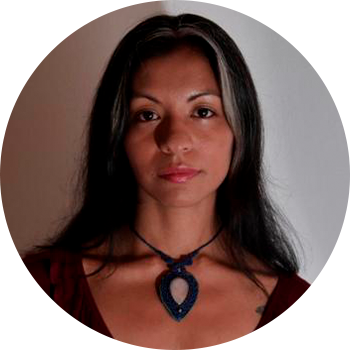
Xochi Bucuru Botache is a Native doctor of Indigenous inheritance. Since adolescence (14 years) she has cultivated the knowledge of traditional medicine, therapeutics and botany that has been preserved through time in the rural and native oral tradition. She has dedicated her life to learn the a diversity of knowledge of ancestral medicine. To strengthen her knowledge, she has done different studies and trainings, with various schools of alternative and integrative medicine that have allowed her to provide a comprehensive medical service today. She have more than more than 10 years of experience practicing in the therapeutic field of natural and ancestral medicine. For 7 years she has expanded her experience to recreate pedagogical scenarios, where she transmits essential knowledge for well-being and conscious health with different methods and tools.
Indigenous Worldview, Property and Extractivism in the Psychedelic Renaissance
October 27, 2021
We hear a lot these days about the “psychedelic renaissance.” An explosion of interest in newly synthesized substances collided with an increasingly globalized world in the second half of the twentieth-century. New religious movements, ethnographic and archaeological studies, and worldwide attempts to control “drugs” around the world brought the use of various plants to broader discussions of (westernized) medicine and intellectual property. Along with globalizing impulses, and following largely western scholars’ impulses to universalize, a rhetoric of “the sacred” has emerged with respect to Indigenous uses of plants in particular but also among synthesized psychedelic substances as well. As we consider the recent discussions and debates, it is useful to be aware of a much longer extractive history of various substances and the impulse to impose eurochristian notions of “the sacred” onto substances / persons decontextualized from traditional Indigenous uses. In this discussion, Professor Tink Tinker (wazhazhe / Osage Nation) discussed the difficulty of the very notion of “property” (intellectual or otherwise) and the impact of extractive thinking on Indigenous worldview. Professor Marcy Norton, author of Sacred Gifts, Profane Pleasures: A History of Tobacco and Chocolate in the Atlantic World was also part of the conversation. Norton’s work addresses the European reception of substances / persons that have become commoditized and made rather mundane, but that maintain traditional ceremonial uses for Indigenous people. Roger Green of Metropolitan State University of Denver moderated the discussion.
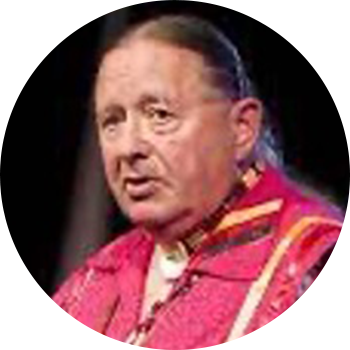
Tink Tinker (Eagle Clan, wazhazhe / Osage Nation) is Clifford Baldridge Emeritus Professor of American Indian Cultures and Religious Traditions at Iliff School of Theology. His publications include American Indian Liberation: A Theology of Sovereignty (2008); Spirit and Resistance: Political Theology and American Indian Liberation (2004); and Missionary Conquest: The Gospel and Native American Genocide (1993). An edited collection by Miguel A. De La Torre, The Colonial Compromise: The Threat of the Gospel to Indigenous Worldview (2021) celebrates Dr. Tinker’s career and teaching. Dr. Tinker volunteered in the Indian community as (non–stipendiary) director of Four Winds American Indian Survival Project in Denver for more than two decades. In that capacity he functions in the urban Indian community as a traditional American Indian spiritual leader. He is past president of the Native American Theological Association and a member of the Ecumenical Association of Third World Theologians. He has been active in volunteer capacities with several denominations at the national level, the National Council of Churches and the World Council of Churches. He currently serves as an “Honorary Advisor” to IMADR, the International Movement against all Forms of Discrimination and Racism; and he also serves locally on the Leadership Council of the American Indian Movement of Colorado.
Latinos Coast to Coast: Taíno’s Talk Plant Medicine
November 24, 2021
In November 2021, Chacruna held a second Community Forum featuring Latinx perspectives. Our panelists were both Taíno men of Puerto Rican descent, bringing bicoastal perspectives on healing themselves and their communities through reclamation of ancestral ceremonial practices. Antonio and Gerard discussed their healing work with plant medicine in the United States and abroad, and shared stories of connecting with Taíno plant medicine traditions. Moderated by Cristie Strongman.
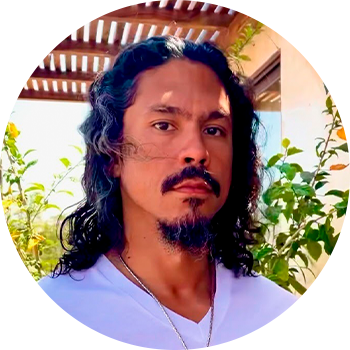
Antonio Cuevas is Cacique (chief) of a Yucayeke (an Afro-Taino village) in New York City. He is a medicine man with a strong Taino lineage, originally from the island of Puerto Rico. He is best known for his passion for truths and for his hands-on involvement in helping awaken his own community by helping uncover their resilient strengths. Antonio believes in the power of the plant medicine Spirits and the empowering messages they bring to the people of his communities. He highlights the integration of the lessons given by the medicines during ceremonies. He works with people one-on-one, in group settings, social and sacred medicine circles – locally, nation-wide, and internationally, as Antonio leads mystical tours to sacred sites. His soul’s quest is to continue to be a humble and dedicated vessel for the insights and knowledge of Divine sacred medicines in all communities around the globe.
Plant Medicines, Environmental Justice and the Struggle to Protect Indigenous Homelands
December 1, 2021
Plant medicine use has long shaped and informed American Indian cultural, clan, and familial identity. Today plant medicines, like peyote, datura and others, continue to play an important role within many tribal communities as they struggle to overcome the legacy of European conquest and colonization. In this special series, Diné (Navajo) activist Nicole Horseherder and American Indian law attorney Brad Bartlett had an intimate conversation on the intersection of traditional cultural use of plant medicines by American Indian communities and how that use informs struggles to protect indigenous lifeways and natural resources.
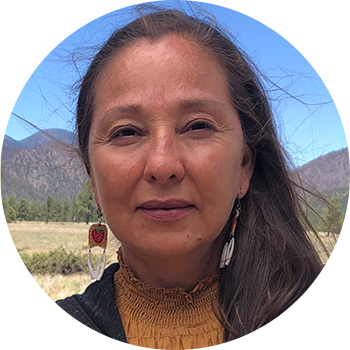
Nicole Horseherder is Diné (Navajo) and executive director of Tó Nizhóní Ání (“Sacred Water Speaking”) which works to protect the environment, land, water, sky and people of her tribal homeland in the Black Mesa region (Dził Yijiin) of Dinétah (Navajo Nation). Navajo Nation, which is bigger than Scotland, is located on the Colorado Plateau in Northeast Arizona and Northwest New Mexico. Nicole’s climate advocacy and leadership on environmental justice matters has been widely featured on NPR, PBS, and elsewhere. In 2019, Nicole was recognized by Elle magazine as one of the world’s leading female voices in the fight against anthropogenic climate change, and in 2021 Time magazine heralded Nicole’s water rights advocacy on the behalf of her tribe. Nicole holds a masters-of-arts in linguistics from the University of British Columbia in Vancouver, Canada. Nicole and her family are active members of the Native American Church (NAC) of Navajo Land. Nicole’s grandfather was one of the first to introduce and facilitate NAC ceremonies on Dinétah, and Nicole and her husband, who is a sundancer and roadman for the NAC, have continued to follow the traditions of her people — traditions which inform her work as an activist. Nicole believes in the importance of preserving and protecting traditional knowledge and traditional cultural expression — including indigenous peoples’ use of peyote and other intellectual property.
Indigenous Perspectives on Yagé Healing, Reciprocity and Our Connections to Mother Earth
July 6, 2022
In July 2022, Pilar Hernandez Wolfe–tenured professor, licensed family therapist, and licensed clinical professional counselor–interviewed Taita Santos Jamioy Muchavisoy, a Kamentza elder based in Sibundoy who travels throughout Colombia as a consultant on Kamentza traditional healing practices. They were in conversation about the potential of plant medicines, like yaje, and fungi, like psilocybin mushrooms, to promote human transformation and deep healing. They explored how a new awareness of the plant world and its unique and diverse expressions of life might emerge in the context of these experiences, alongside the potential of establishing reciprocal relationships with mother earth. Humans may develop a heart-felt awareness of the role they play in the cycles of construction, destruction, accommodation, and change embedded in the relationships with the environment and all those who inhabit it. They may develop new or more nuanced relationships with their lands, food systems, and animals, and also become more aware about the human systems that generate pain and destruction for nonhuman life on the planet. Learn and reflect on the meaning of taking sacred plants and fungi not only for personal healing, but also to create reciprocity with mother earth and accountability to other humans and the other beings on the planet.
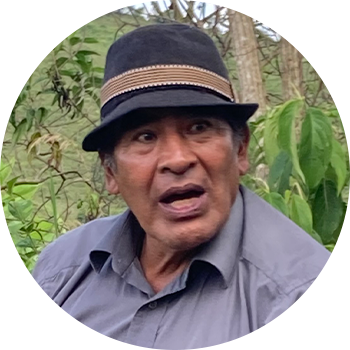
Santos Jamioy Muchavisoy, M.A. is a Kamentza elder or “Taita.” He was elected Kamentza governor four times (1994–2010) and was staff consultant for the state of Putumayo (2016–2018). He holds a master’s degree in human systems from the Universidad Central de Colombia and diplomates in Law and Indigenous Legislation. He was an adjunct professor at the Technological Institute of Putumayo and at Remington University in Medellín, Colombia. He is a member of the council of wise elders supporting the Master’s on Mother Earth at the University of Antioquia in Colombia where he is also adjunct faculty. He is a traditional healer based in Sibundoy and travels throughout Colombia as a consultant on Kamentza traditional healing practices.
Traditions in Dialogue: Indigenous Wisdom and Psychedelic Research
March 20, 2024
This community forum explored intercultural dialogues, co-creations, and dissonances between Indigenous wisdom and cutting-edge psychedelic research. Together, we delved into the complexities of dialoguing traditional knowledge with modern scientific inquiry, navigating challenges while fostering meaningful collaboration. Join our vision of a future where Indigenous voices play a central role in the psychedelic renaissance, offering diverse insights for holistic healing and cultural renewal. Led by esteemed speakers Jimena Chalchi, a Global Leadership researcher specializing in intercultural collaboration for mental, spiritual, and planetary health, and Alejandra Barajas, project coordinator and member of the Chacruna’s Women, Gender Diversity, and Sexual Minorities Working Group.
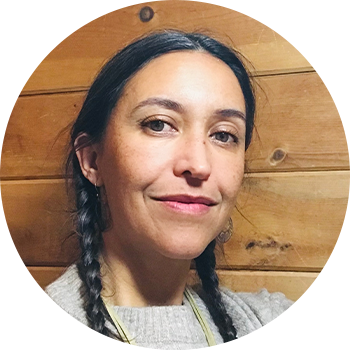
Jimena Chalchi is a Global Leadership researcher focused on models and systems for intercultural collaboration between Indigenous and non-Indigenous peoples for mental, spiritual and planetary health. Her research is extensive on the traditional knowledge, philosophy and traditions of Indigenous entheogenic medicine in the Anauhuac, Mayab, and Tawantinsuyu. She is a land-based healer who works body-mindset depatriarchalization, and decolonization through the communion with the medicines and other Indigenous relational technologies.
Psychedelic Culture 2024 in Preview: Cultivating Change through Decolonial Dialogues
April 11, 2024
In the lead-up to Psychedelic Culture 2024, Chacruna offered space for some of the speakers, Chacruna staff, conference attendees and the general public to come together and explore some of the important conversations that would later take place at PCU. Psychedelic Culture 2024 platformed Chacruna’s main initiatives: Indigenous Reciprocity & Decolonial Dialogues, Psychedelic Justice, Protection of Sacred Plants & Cultural Traditions, and voices from the Global South. Our main motto for this conference was Cultivating Roots for Cultural Change. This community forum was joined with Christine Diindiisi McCleave, who is an enrolled citizen of the Turtle Mountain Ojibwe Nation and spoke on a panel at the conference titled Who benefits from the Psychedelic ‘Renaissance’? Indigenous Reciprocity, Decolonization, and Plant Medicine Conservation; Dr. Stephanie Michael Stewart, who is a member of Chacruna’s Racial Equity and Access Committee and a board member, who spoke on a panel at the conference titled Shaping our Future: Ensuring equity and access in the psychedelic renaissance; Joseph Mays, former Program Director of Chacruna’s Indigenous Reciprocity Initiative (IRI) and moderated the panel featuring Christine at the conference; Allison Hoots, who is a member of Chacruna’s Council for the Protection of Sacred Plants and spoke on a panel at the conference titled Sacred Plant Alliance (SPA): Religious Freedom and Legal Protections in the Plant Medicine Space; and moderator Alejandra Barajas, who is the Program Coordinator for Chacruna Institute and worked hard to make the conference happen.
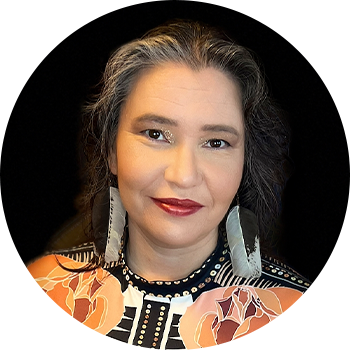
Christine Diindiisi McCleave, enrolled citizen of the Turtle Mountain Ojibwe Nation, is a doctoral student at the University of Alaska Fairbanks Indigenous Studies program with a focus on Indigenous Knowledge Systems of entheogenic plant medicines for healing. Her master’s thesis on Native American spirituality and Christianity and the spectrum of Native spiritual practices today, including Peyote religion, led her to become CEO of the National Native American Boarding School Healing Coalition where she helped introduce a bill for a national truth commission and worked with the United States Department of the Interior to investigate Indian Boarding Schools. Currently, she is facilitating Colorado’s Tribal Working Group under the Natural Medicine Health Act. In 2023, she was listed as one of 75 influential, innovative, and disruptive women in Psychedelics by DoubleBlind magazine. She is currently a member of the board for the Minnesota Council of Churches and the Vice President of the board for the Psychedelic Society of Minnesota.
Creating relations with plant medicines beyond psychedelics
May 29, 2024
In this discussion we explored the importance of cultivating deeper connections with plant medicines beyond psychedelics. Explore the significance of traditional protocols, the importance of building relationships with all plants, and the integral role of local ecosystems. Discover how embracing various plant relationships, from culinary herbs to gardening, enhances and complements psychedelic experiences. Examine the significance of language and culture in plant medicine practices. Our guest speakers were Angela Angel, a multifaceted healing practitioner, gardener, artist, medium/channeler, and ceremonialist, and Atava Garcia Swiecicki, MA, RH (AHG), a renowned herbalist, author, and educator.
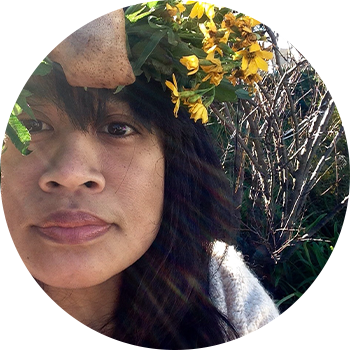
Angela Angel is a healing practitioner, gardener, artist, medium/channeler and ceremonialist. She has continued her indigenous lineage as a young traditional healing practitioner (Bontoc and Ibaloi tribes- Igorot, Philippines). Angela received a vision directing her to explore how ritual and our innate psychic abilities can translate in the “modern world” as a step to bridge our ancestral knowledge and to begin healing historical trauma. She has since worked to integrate this directly with her social justice work. In 2013 she began coordinating free holistic and traditional healing clinics with the Bay Area’s Healing Clinic Collective. She loves tending to her garden and facilitating the connection of plants with people. She is a certified clinical herbalist and integrates indigenous ancestral medicine in her classes. Angela runs regular classes in healing and plants including Ninunong Gamot, Philippine Folk and Ancestral Medicine and Decolonizing Wellness.
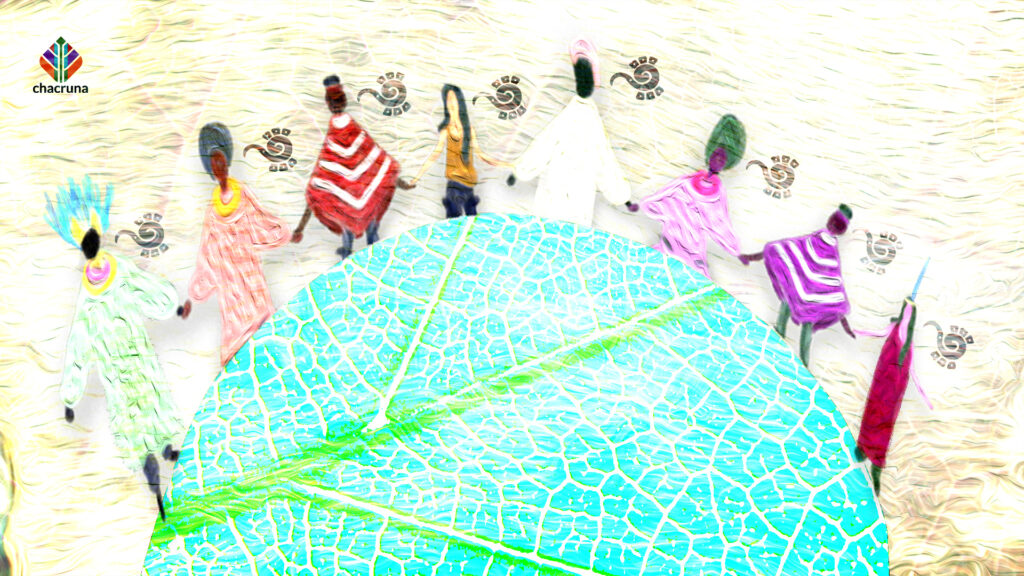
II. IN-PERSON COMMUNITY DIALOGUES
Documenting the Rise of Huni Kuin Culture in the Heart of the Amazon
July 18, 2019
The Huni Kuin had a hard time living in their homeland; they were once forbidden to live their own culture and speak their own language. After many years living in slavery to white people, abusing alcohol, and being castrated by the church, they have awakened to return to their roots, rediscovering their ancestors and remembering their culture, once forbidden and censored. This film is about a region where they stood up for themselves and changed their destinies forever, entering a new era: the time of indigenous rights. In this new era, the Huni Kuin again live in harmony with nature, bearing their sacred knowledge and sharing their healing culture around the world through the wisdom and spirituality of the forest. They also share their own cultural festivals, where they unite the indigenous with the non-indigenous, creating a great cultural apex. We hope this film can help other Indigenous lands, and societies as a whole, to get back to their roots and be in harmony with themselves and planet Earth.
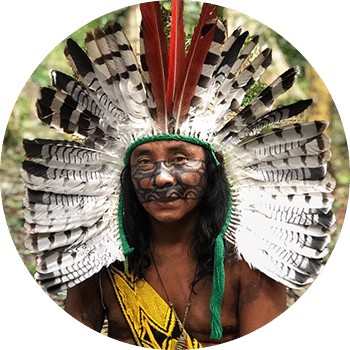
Ninawa Pai da Mata is a Spiritual Leader and Master Huni Kuin ‘Pajé’ Shaman from Novo Futuro village, which are located at Humaita region of Acre estate in the Brazilian Amazon.For the past 6 years he been organizing the Festival Huni Kuin Eskawatã Kayawai in his village with his community, and also implementing projects for bettering their way of living in his homeland in nowadays with his indigenous charity Instituto Socio-Cultural Huni Kuin, and he been dedicating his life since a decade on spreading the message, and spirituality of the forest and the Huni Kuin around the globe. He is a beautiful spirit that carries with him a long lineage and vast ancient wisdom of many thousands of years from his tribal Huni Kuin ancestors. Ninawa is a being of love and compassion and this is his second time visiting the USA, bringing messages of healing for the planet, his beautiful music, chants and teachings from the forest.
Oakland’s Premiere The Peyote Files Documentary
October 17, 2019
The Peyote Files is a documentary web series following anthropologist Dr. Bia Labate in the search for the elusive peyote cactus in West Texas. Built around the frank exchanges between Bia and the cactus expert and conservationist Dr. Martin Terry, this three-part series offers an eye-opening insight into Martin’s pioneering work to understand the threats faced by peyote and the urgent action needed to ensure its survival. In episode one (Peyote Territory) Bia and Martin trek through peyote’s natural habitat and discuss its unusual morphology, psychoactive nature, history of human interest, and Martin’s irrepressible zeal for all things cacti. Martin’s rigorously scientific understanding of peyote’s evolutionary context challenges the mystical assumptions often underpinning the role of its psychoactive properties. Returning to Alpine in episode two (Peyote Threats), Martin shows Bia the collection of peyote cacti he nurtures and studies in his fortified greenhouse—following strict DEA regulations—and explains the current threats to peyote populations, such as the destruction of peyote’s habitat and the pressures of overharvesting. In episode three (Peyote Conservation), Martin outlines the research and action he is carrying out, along with the Cactus Conservation Institute, to mitigate these threats, including spreading awareness of sustainable harvesting techniques, the impact of frequent, repeat harvesting, and the urgency of cultivation. Throughout the series, different epistemological approaches to, and ontological conceptions of, peyote are discussed, as well as the political implications of protecting an indigenous sacrament. This series represents a testament to Martin’s tireless conservation efforts and a call to action to recognize and respect the right to exist of this extraordinary cactus, before it’s too late.
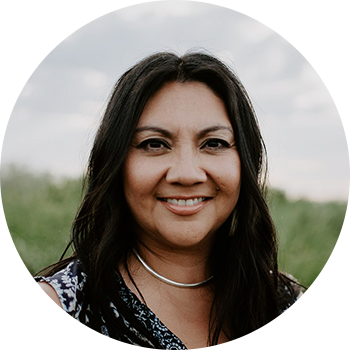
Dawn D. Davis is a mother, a wife, and a PhD student at the University of Idaho in the Natural Resources program. Her current research uses GIS as one tool to analyze the environmental and anthropogenic issues that surround the revered peyote (Lophophora williamsii) plant, which is integral to her spiritual practice as a Shoshone-Bannock Tribal woman. She is a twice awarded National Science Foundation recipient as a fellow under the Integrative Graduate Education Research Traineeship and as an Indigenous Science Technology Engineering and Math scholar. Dawn has shared her research among Native American, academic, ethnobotanical, and psychedelic audiences nationally and internationally.
III. CONFERENCES
~SACRED PLANTS IN THE AMERICAS I~
The Peyote Landscape: practices and challenges for the present and the future
February 23, 2018
Aukwe García Mijarez, Lisbeth Bonilla, Santos Rentería, Matsiwa de la Cruz Carrillo, Federico Arellano Vazquez
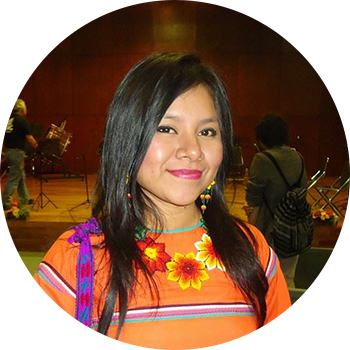
Aukwe García Mijarez es de la comunidad Wixárika de Tatei Kie, San Andrés Cohamiata, Jalisco, Aukwe (en Wixárika significa Magnolia). Estudió en el Instituto Tecnológico y de Estudios Superiores de Occidente (ITESO) y se graduó como Licenciada en Ciencias de la Comunicación en el 2016. Actualmente trabaja como Coordinadora de la Mesa de Comunicación del Consejo Regional Wixárika y es colaboradora en el Programa de Radio “Territorios” de la Universidad de Guadalajara.
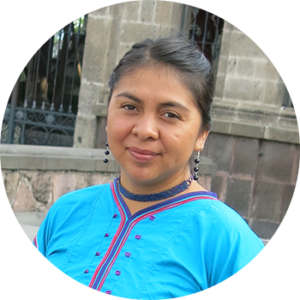
Lisbeth Bonilla’s name in the Wixárika language is Kupuri, which means Sacred Water. She comes from the community of Tateikié in San Andrés Cohamiata, Jalisco. She left her place of origin at the age of seventeen to get a degree in Administration at ITESO, the Jesuit University of Guadalajara, to gain expertise in the area of income-generating projects in order to build the local economy. Even from afar, she has maintained a close bond with her people, both in her professional life and as a Wixárika community member. In the city, she has been in constant contact with other Wixáritari who have settled in the Guadalajara metropolitan region. There, Wixárika women have further strengthened their community bonds through organized sports. On her mother’s side, she descends from a traditional family line, allowing her to participate in cultural activities at Tateikié, the ceremonial center of Tunuwame. She has had the privilege of accompanying pilgrims or jicareros from this center on two pilgrimages to Wirikuta, the sacred peyote desert. As a young Wixárika, she has observed the growing pace of globalization and influence of capitalism among her people, for better or worse. In this context, she plans to practice her career while continuing on the path of family traditions. She believes that the experience of being immersed in two different cultures makes education a vital tool for being Wixárika in the 21st century.
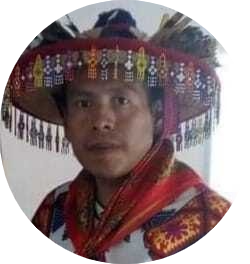
J. Santos Rentería Carrillo es Abogado Wixarika, de la comunidad de Paso de Alica, del Nayar, Nayarit, Mexico. Egresado de la Universidad del Alica, con Maestría en Ciencias Administrativas de la Universidad Autónoma de Nayarit, así como Licenciado en Educación Indígena de la Universidad Pedagógica Nacional. Es miembro Fundador de la Unión de Profesionistas Indígenas de Nayarit A.C. Ha laborado en distintas áreas gubernamentales en materia de Procuración e impartición de Justicia, así como de asesoría legal. En el ámbito profesional, ha participado en foros, conferencias, seminarios sobre temas de Derechos Indígenas, incursionando en la Defensa de Procesados Indígenas desde la perspectiva de los Derechos Humanos. Ha sido litigante de distintos juicios en materia de Amparo, y de protección de los derechos políticos electorales de indígenas en Nayarit. Actualmente es miembro del Poder Judicial de la Federación, con especialidad Operador de Justicia.
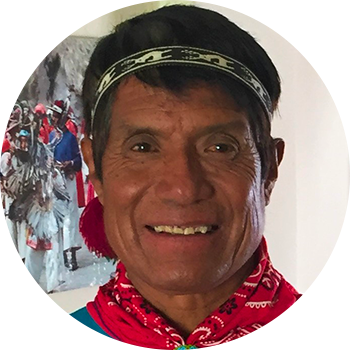
Matsiwa de la Cruz Carrillo es originario de la comunidad wixárika de Tuapurie (Santa Catarina Cuexcomatitlan, Jalisco). Desde su juventud ha estado profundamente involucrado con las prácticas tradicionales de su centro ceremonial. Ha completado tres ciclos de cinco años como ‘jicarero’ del centro ceremonial de Kieruwitüa, un total de 15 años. Aun cuando no ha sido miembro de un grupo de peregrinos, ha hecho su peregrinación anual a Wirikuta y a otros sitios sagrados. Recientemente, fue nombrado por cinco años como uno de los líderes y ancianos para el grupo de peregrinos de Kieruwitüa.
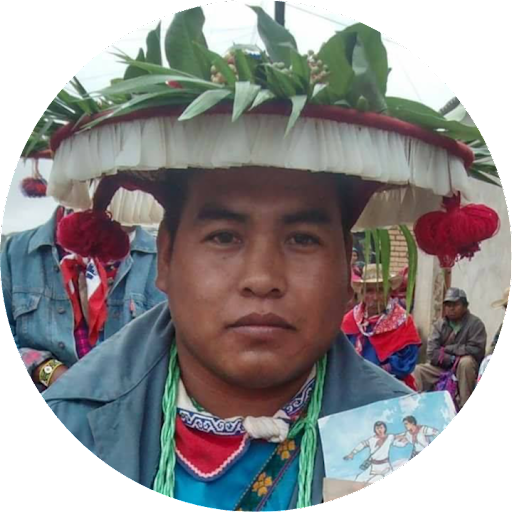
Federico Arellano Vázquez es un joven Wixarika de la comunidad de San Sebastián.
Legal and Political Challenges of Peyote Use: An Original Wixárika Perspective
Santos Rentería

J. Santos Rentería Carrillo es Abogado Wixarika, de la comunidad de Paso de Alica, del Nayar, Nayarit, Mexico. Egresado de la Universidad del Alica, con Maestría en Ciencias Administrativas de la Universidad Autónoma de Nayarit, así como Licenciado en Educación Indígena de la Universidad Pedagógica Nacional. Es miembro Fundador de la Unión de Profesionistas Indígenas de Nayarit A.C. Ha laborado en distintas áreas gubernamentales en materia de Procuración e impartición de Justicia, así como de asesoría legal. En el ámbito profesional, ha participado en foros, conferencias, seminarios sobre temas de Derechos Indígenas, incursionando en la Defensa de Procesados Indígenas desde la perspectiva de los Derechos Humanos. Ha sido litigante de distintos juicios en materia de Amparo, y de protección de los derechos políticos electorales de indígenas en Nayarit. Actualmente es miembro del Poder Judicial de la Federación, con especialidad Operador de Justicia.
The Effects of Hueyitlacatsintle and the Visions of a Nahua Healer
February 23, 2018
Emilano Soriano Vicente
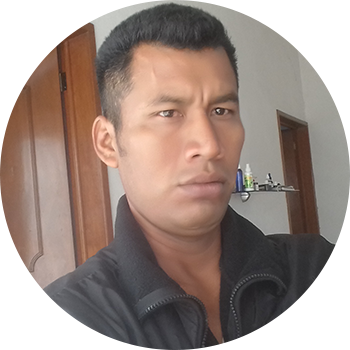
Emiliano Soriano Vicente nacío el día 05 de Enero de 1980 en la comunidad de Tlalcozotitlan Municipio de Copalillo Guerrero, lugar donde le criaron sus abuelos desde los 7 años de edad y donde el oficio de su abuelo era curandero. Desde el 2005 hasta la actualidad labora en el estado de Morelos en el programa de Actores Sociales de la Flora Medicinal en México (ASFM) del Instituto Nacional de Antropología e Historia (INAH), que se enfoca a conservar el patrimonio cultural material e inmaterial de México. Trabaja como auxiliar de campo e intérprete del español al náhuatl, en los estados de Morelos y Guerrero en la que opera el programa de investigación de las plantas medicinales. Mediante este trabajo ha concluido la Licenciatura en Comunicación y Gestión Intercultural en la Universidad Autónoma del Estado de Morelos (Cuernavaca Morelos) de la generación 2013-2017. Se ha involucrado en la cultura de las plantas medicinales de la región Copalillo Guerrero, en particular en su comunidad: Tlalcozotitlán, en la que tiene la meta de cumplir, registrar y conservar el conocimiento sobre la medicina local de las plantas silvestres, que se resguardarán en un museo que está en proceso de gestión y a partir del cuál hará más gestiones de proyectos productivos y culturales.
Songs in the Night: Spiritual Resistance and Defense of Territory in the Columbian Amazon
February 24, 2018
Miguel Evanjuanoy (UMIYAC)

Miguel Evanjuanoy Chindoy is a member of the Inga people from Putumayo, Colombia. He was born in a beautiful hilltop village part of an indigenous territory named Yunguillo, where the local cosmovision and collective work are the pillars of community life. Miguel is a community leader and environmental engineer and has been a devout follower of yagé (ayahuasca) medicine since his childhood years. He acts as a spokesperson for the Union of Indigenous Yage Medics of the Colombian Amazon (UMIYAC). Specifically, his work focuses on the role that indigenous spirituality plays in territorial defence and environmental conservation. He is also interested in how yage medicine practiced by local, indigenous traditional healers contributes to peacebuilding, the improvement of community health, and the reconstruction of the social fabric in war torn rural Colombia. Recently Miguel has been speaking internationally about the impact that development models based on extractive economy and on the depletion of earth’s vital resources are having on the Amazonian biocultural ecosystems. On behalf of his organization and community, he is also taking a stand against cultural appropriation and the indiscriminate commercialization of indigenous practices and sacred plants, with the claim that this “marketed spiritualty” is negatively impacting both indigenous peoples and urban users alike.
The Specialty of Sipáame in the Sierra Tarahumara
February 25, 2018
Felipe Fuentes
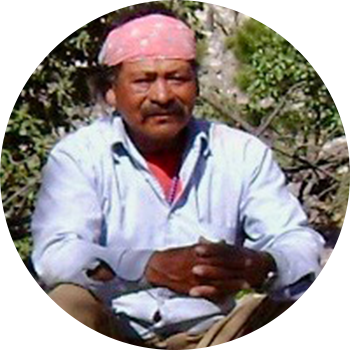
Felipe Fuentes es sipaame, curandero rarámuri especializado en el trabajo con jículi (peyote) y bakánoa. Originario de la localidad de Naráchi, municipio de Carichí en el estado de Chihuahua, México. Se dedica a la agricultura, es esposo, padre y abuelo. Durante algunos años emigró a Ciudad Juárez, en donde estuvo trabajando en diferentes actividades. A su regreso a la Sierra Tarahumara comenzó su formación como ayudante de sipáame y luego de algunos años se consolidó como tal. Debido al prestigio que ha logrado como especialista ritual es muy solicitado en varias localidades de la Sierra a las que acude para sanar a las personas (*participación a confirmar).
Chjota Shine and the Medicine of Holy Children
February 23, 2018
Félix Ramírez
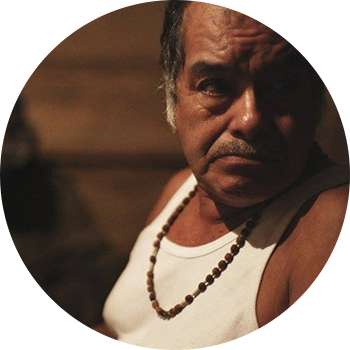
Don Félix vive en San José Tenango, Oaxaca. Es un hombre dedicado a trabajar la tierra, nació hace 72 años en Huautla de Jiménez, Oaxaca, paso los primeros años de su niñez en aquel lugar, por diversos motivos migraba entre la sierra mazateca y Veracruz. Tras pasar unos años decidió regresar para formar una familia en la sierra mazateca baja, en el municipio de San José Tenango. En esos años dedicándose cada vez más al trabajo de la tierra, y enfrentando un sin número de carencias materiales, encontró la forma idónea para curarse a sí mismo y a los suyos, por medio de los hongos, los pequeños que brotan. Con 40 años cumplidos comenzó a trabajar la medicina como él le dice, y desde ese momento no ha dejado de ayudar a sus amigos, vecinos y demás personas que se acercan a él en búsqueda de curación. Félix obtuvo su mesa de curación hace poco más de 30 años, y es especialista en la ingesta de Ndi xijto, además de realizar limpias para aliviar diversas enfermedades y ofrendar a la madre tierra. En el año 2012 fue pieza clave en el Primer Festival Nacional de la Culturas Vivas en Resistencia celebrado en la Escuela Nacional de Antropología e Historia.
Teonanácatl: a feminine medicine for the Mazatecs
February 23, 2018
Gabriel Eduardo Estrada Martínez
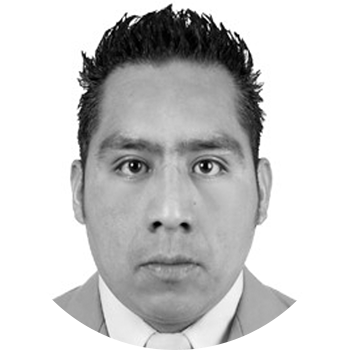
Gabriel Eduardo Estrada Martínez es natural de San Mateo Yoloxochitlan, Oaxaca. Es licenciado en Antropología Social por la Universidad Autónoma del Estado de México (UAEM).Tiene un diplomado en en Medicina Tradicional Mexicana por la Universidad Autónoma de Chapingo (UACH). Ha recibido el reconocimiento como “Mazateco Distinguido” en el 117 Aniversario del Natalicio de María Sabina, en Huatla de Jiménez, Oaxaca por haber dado la conferencia “El cambio sociocultural del rito en el consumo de hongos alucinógenos en Huahutla de Jiménez, Oaxaca”. Ha sido guía de campo en la sierra mazateca para la investigadora Karina Malpica en sus investigaciones de acuerdo al análisis de las mediciones bioenergéticas.
The Mazatecs of Huautla Before and After the Publication of the Sacred Mushroom Ceremonies
February 23, 2018
Inti García Flores
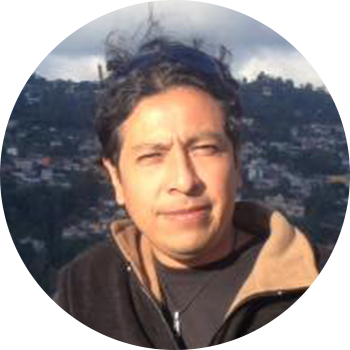
Inti García Flores es mazateco de Huautla de Jiménez, investigador de la cultura mazateca y licenciado en Historia, maestro de escuelas secundarias de la región. Es hijo de Renato García Dorantes quien, en vida, realizó investigaciones y publicaciones de la mazateca. En el año 2012 colaboró en un proyecto de catalogación para rescatar el archivo de la familia. Realizó un catálogo crítico y realizó la digitalización del acervo fotográfico para la consulta pública dentro de la comunidad. También ha participado como conferencista en el coloquio “Seis acercamientos a la región mazateca”, en el museo Nacional de Antropología e Historia de la ciudad de México. Actualmente pertenece al Grupo de Archivistas Audiovisuales de Oaxaca y resguarda el Archivo Histórico Renato García Dorantes, el cual conserva las investigaciones realizadas por su padre; dicho acervo se compone de: documentos, libros, audios, videos en distintos formatos y foto fija.
Jix Xidhuukam: plants and sacred places in the cosmovision of the O’dam of southeastern Durango
February 24, 2018
Honorio Medina
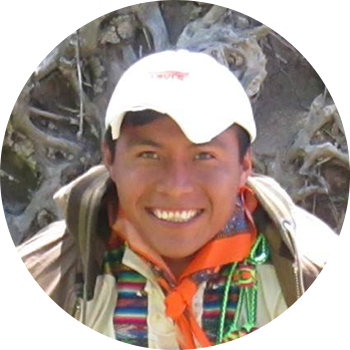
Honorio Mendía Soto es originario del pueblo o’dam o tepehuanos del sur. Es Licenciado en derecho, por la Universidad Juárez del Estado de Durango, y maestro en Estudios Antropológicos, por la Universidad Autónoma de Querétaro. Trabaja temas de derechos de las personas, comunidades y pueblos indígenas; y se especializa en sistemas normativos y elección de autoridades entre los o’dam. Respecto a su experiencia laboral, ha sido: asistente jurídico, en la Comisión Nacional para el Desarrollo de los Pueblos Indígenas, Delegación Durango; asistente de investigación, en el Instituto Nacional de Antropología e Historia de México; subdirector de Investigación, en la Escuela de Antropología e Historia del Norte de México; y actualmente, se desempeña como asesor-investigador en derechos indígenas y derecho electoral, en el Consejo General del Instituto Electoral y Participación Ciudadana del Estado de Durango. Es miembro-fundador del colectivo Centro de Estudios y Asesoría para Pueblos indígenas-Durango, a través del cual brindan asesoría y acompañamiento gratuito, entre otros temas, sobre derechos indígenas.
Coca and Tobacco in the Process of Rebirth of the Mhuyska People of Colombia
February 24, 2018
Jate Kulchavita Bouñe
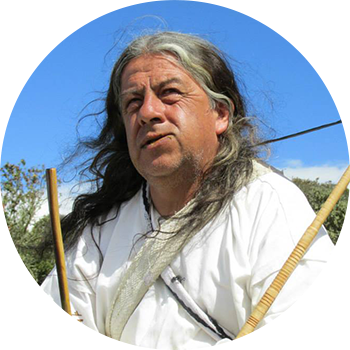
Jate Kulchavita Bouñe forma parte del proceso de renacimiento del pueblo Mhuyska. Es gestor de la recuperación de la casa sagrada Mhuyska en Ráquira, Boyacá, que generó la construcción de las casa sagradas en otras comunidades Mhuyskas y ecoaldeas de Colombia. Bajo la tutoría del Jate Kogui Aluka se formó como sabedor espiritual (Jate), recibiendo junto con algunos compañeros, el precioso legado guardado por cinco siglos. Con los indígenas Huitoto del Amazonas colombiano, se formó además en el arte del mambeadero – ritual de la palabra de vida: palabra de coca y tabaco – y gracias a estos conocimientos ancestrales y a su formación académica en antropología y psicología, ha logrado sintetizar el pensamiento de la cultura Mhuyska en lo que llama la matriz Espiral Tchiminigagua, un modelo que permite realizar un puente, un acuerdo original, entre los saberes ancestrales y la cultura occidental moderna.
The Continued Globalization of Ayahuasca: An Indigenous Perspective
February 24, 2018
Leopardo Yawa Bane
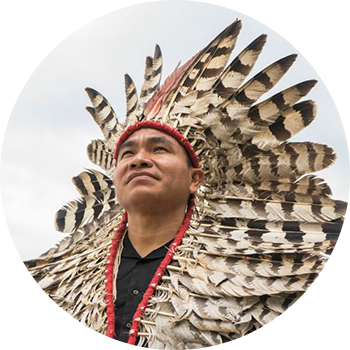
Leopardo Yawa Bane es hijo de un jefe tradicional de los Huni Kuin (grupo indígena también conocido como cashinahua). Leopardo Yawa Bane es un defensor del patrimonio ecológico de las tierras nativas de estas personas, doméstica e internacionalmente. Nacido en la Reserva cashinahua del Río Jordán, en el estado de Acre, Brasil, Bane y su hermano Fabiano fueron enviados de las villas a las ciudades brasileñas a corta edad por su padre y jefe, para aprender nuevos conocimientos del mundo fuera del bosque, así como para representar a su gente en la tradición, herencia y política. Desde entonces Bane ha completado sus estudios universitarios, aprendiendo a hablar portugués de manera fluida y comenzó a representar a su gente nacional e internacionalmente como embajador y curandero. Bane y su gente ven la mística y natural dualidad de las plantas y cómo se puede acceder al mundo espiritual a partir de las plantas encontradas en sus áreas nativas. Como es común con las tribus indígenas alrededor del mundo, y particularmente con las amazónicas, los Huni Kuin, tienen una propia y única cosmovisión, de la creación al más allá, derivada de la sabiduría de las plantas y su historia compartida. Bane creció usando y siendo entrenado en las plantas medicinales por su abuelo. Hace quince años empezó usando diferentes plantas medicinales con personas no indígenas. Bane trae el conocimiento de sus ancestros, de su gente, del bosque.
Traditional Shipibo Medicine, Past, Present and Future: an intercultural encounter
February 24, 2018
Laura López Sánchez
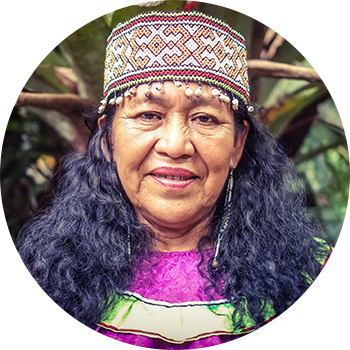
Laura López is a 56-year-old Onaya (a healer that works with plants in the Shipibo tradition). For 20 years she has been working with Oni, or «wisdom / knowledge», the Shipibo name for ayahuasca. Her Shipibo name is Chono Yavi, or «Swallow», a bird that is very protective of its nest. In the Shipibo tradition, swallows are regarded as guardians to their families, a role that Laura fulfills with strength, tranquility and patience. Laura began her journey in the world of ancestral medicine at age 8, accompanying her mother Ynes and listening to the ikaros (the medicine songs characteristic of the Shipibo medical practice) that her uncles and grandparents sang in the ceremonies that they led in the community of Roaboya, in the Amazonian province of Ucayali. Following the customs of the Shipibo people, from a tender age, Laura’s grandparents would make her take tobacco juice through the nose well before dawn, in order to gain the strength and motivation needed to work in the chacra (family farmland). These early experiences rooted Laura’s connection with the earth and plants. At age 17, she underwent her first dieta, and she began drinking ayahuasca when she turned 20. Soon afterwards she was traveling with her mother all over Peru, offering ceremonies for the local communities. After many years of experience, Laura arrived at the Temple of the Way of Light, a healing center near the city of Iquitos where she currently works. Furthermore, Laura also runs plant dietas in the new center of her family, Niwe Rao Xobo, near the city of Pucallpa.
The Shipibo Woman in the World of Traditional Medicine: a personal story
February 24, 2018
Lila López Sánchez
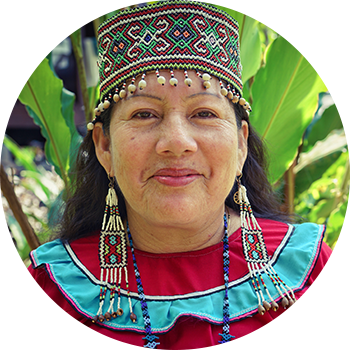
Lila López Sánchez is a 49-year-old Onaya (a healer that works with plants in the Shipibo tradition). For 20 years she has been working with Oni, or «wisdom / knowledge», the Shipibo name for ayahuasca. Her Shipibo name is Kana Jesbe, or «Ray-Thunder that opens with medicine», a name she received at birth from her paternal grandfather, her first teacher. Lila was born in the native community of Roaboya, along the banks of the Ucayali River in the ancestral land of the Shipibo people. Raised in the bosom of a large family of traditional healers, from a young age she watched her grandparents heal with the help of plants, the smoke of the mapacho (tobacco) and the ikaros, the medicine songs that are characteristic to the Shipibo medical practice. After suffering from a long illness caused by a daño (damage) inflicted by a brujo, Lila began walking a path of healing and discovery that would derive in her vocation as a healer. She started drinking ayahuasca and learning the ikaros with her mother, Ynes, progressively gaining confidence until, 4 years after her first Ayahuasca experience, she began her path as an Onaya. In present times, Lila works as a healer at the Temple of the Way of Light, a healing center near the city of Iquitos. She also runs plantdietas in the new center of her family, Niwe Rao Xobo, located near the city of Pucallpa.
The Word of Coca and Tobacco: Seeds of Life
February 24, 2018
Mamma Senchina (Santiago Zarabato)
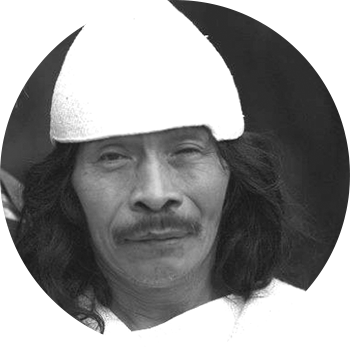
Mamma Senchina (Santiago Zarabato) es un anciano-sabedor de la comunidad Kogi de la Sierra Nevada de Santa Marta, Colombia. Proviene de un linaje que resguarda la palabra de consejo que ha sido salvaguardada en la coca y el tabaco por muchas generaciones atrás. Heredó de su familia Kogi-Wiwa el legado de su suegro: “el Mamma Aluka”, un anciano-sabedor que emigró de la Sierra hacia la región cundí-boyacense a mediados de los años 90 para compartir las enseñanzas y las semillas del nuevo amanecer. Mamma Senchina fue uno de los únicos sobrevivientes al rayo que cayo el 08 de agosto del 2014 en una de las principales casas ceremoniales de la sierra. Después de esta experiencia cercana a la muerte emprendió un viaje por diversos territorios haciendo pagamentos en cerros y lagunas, refrendando los acuerdos de origen con otras comunidades y desde hace 3 años se asentó en Cundinamarca, lugar cercano a donde vivió su suegro, el Mamma que compartió el legado Kogi-Wiwa con los Mhuysqas renacidos. La sabiduría que resguarda Mamma Senchina se sustenta en el ordenamiento del Gonawindua, el pensamiento de los cerros tutelares o picos nevados de la sierra; considerado por muchos como ¨el corazón del mundo¨. El consejo de estas comunidades ha sido preservado por medio de la tradición oral, en mitos, cantos y danzas y es orientado por medio de la consagración de la coca, el tabaco, y el constante cuido del poporo y el huso. Además Mamma Senchina ha sido testigo y partícipe del surgimiento de los ¨Cacaoteaderos¨ (una entremezcla entre el tradicional mambeadero y la emergente ¨cacao ceremony¨); procesos comunitarios incluyentes en torno al Chocolate, donde se abre espacio y un contenedor seguro para la resolución de conflictos y el diálogo humanizado. La palabra-acción que el Mamma comparte está orientada a garantizar el cuidado, la siembra y el pervivir de la semilla de vida, en sus mochilas de sabiduría se preservan diversas metodologías que nos recuerdan cómo se siembra la gente, cómo se siembra la comida que sostiene la existencia de la gente y cómo se nutre la homeostasis planetaria por medio del cuidado de todas nuestras relaciones.
Mushrooms and Struggles for the “Absolute Truth” in the Mazateca Alta of Oaxaca
February 23, 2018
Osiris García Cerqueda
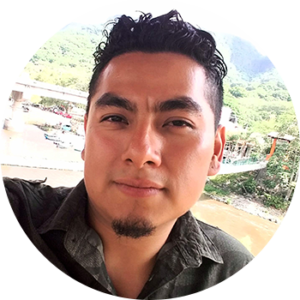
Osiris García Cerqueda es originario de Huautla de Jiménez, Barrio de la Cruz, Oaxaca. Licenciado en Historia por la Facultad de Filosofía y Letras de la Benemérita Universidad Autónoma de Puebla y maestro en Historia por el Instituto de Ciencias Sociales y Humanidades “Alfonso Vélez Pliego” de la misma institución universitaria. Se ha dedicado al estudio y reconstrucción de la historia contemporánea de comunidades de la mazateca alta de Oaxaca, mediante el uso de la historia oral y recolección de fuentes documentales, así mismo, al estudio y análisis de las manifestaciones rituales y simbólicas de los mazatecos. Ha participado en diversos congresos como ponente con temas de historia del indigenismo en México, uso de enteógenos entre los mazatecos e historia contemporánea de Huautla de Jiménez, Oaxaca. Entre sus publicaciones se encuentra la revista independiente “Mirador Mazateco” (2010 a la fecha), y el libro “Huautla, tierra de magia, de hongos… y hippies” (BUAP-2014). Actualmente se desempeña como docente a nivel medio superior y como estudiante del doctorado en Sociología del Instituto de Ciencias Sociales y Humanidades “Alfonso Vélez Pliego” de la Benemérita Universidad Autónoma de Puebla.
Indigenous Perspectives on Peyote’s Healing Potentials and Conservation Challenges
February 23, 2018
Sandor Iron Rope
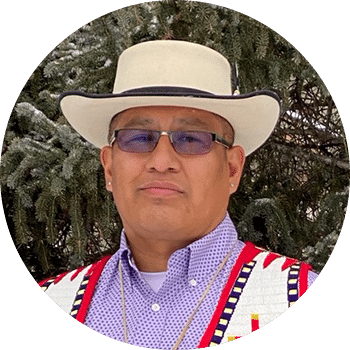
Sandor Iron Rope is Oglala Lakota Oyate from Pine Ridge South Dakota. Mr. Iron Rope received his B.A. in Human Services and American Indian Studies from the Black Hills State University. He serves as President of the NAC of South Dakota and former chair of NAC of North America. He is also the executive director of “TTO,” a non-profit committed to peyote conservation and the preservation of Lakota Culture and Health. He is a member of the Board of Directors of the Indigenous Peyote Conservation Initiative.
Ayahuasca, a World of Exchanges and in Constant Exploration
February 24, 2018
Segundo Crispin Chindoy

Taita Crispin Chindoy, miembro del Pueblo Indígena Camentsa del Valle de Sibundoy, Putumayo, Colombia. Estudiante de antropología de la Universidad Externado de Colombia, investigador sobre las plantas sagradas y culturales. Reconocido como autoridad tradicional para el ejercicio de la medicina por su comunidad. Ha tenido la oportunidad de realizar diferentes intercambios culturales para complementar sus estudios en otros en países de América y Europa. Con interés en la defensa, reconocimiento y protección de los individuales y colectivos, como también por el fortalecimiento de la memoria histórica que sustentan los saberes ancestrales.
Through the Sacred and the Everyday: the uses of agave among the O’dam of southeastern Durango
February 24, 2018
Selene Galindo Cumplido
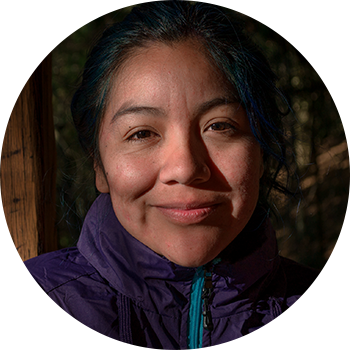
Selene Yuridia Galindo Cumplido es Licenciada en Antropología Social por la Escuela Nacional de Antropología e Historia. O’dam del municipio del Mezquital, Durango. Actual asistente de investigación en el Programa Nacional de Etnografía de las Regiones Indígenas de México en el Nuevo Milenio bajo la línea de investigación “Diversidad cultural, discriminación y desigualdad social”, miembro del equipo Sierra Madre Occidental. Realizó su investigación de tesis con los Tohono O’odham de Quitovac, Sonora sobre el concepto de comunidades de práctica. También llevó a cabo una investigación etnobotánica como parte del Proyecto Arqueológico Sextín. Ha impartido clases de antropología médica en la Facultad de Enfermería y Obstetricia de la Universidad Juárez del Estado de Durango.
The Ancestral Biodiversity of Medicinal Plants in the Sibundoy Valley
February 24, 2018
Taita Juan Bautista Agreda Chindoy
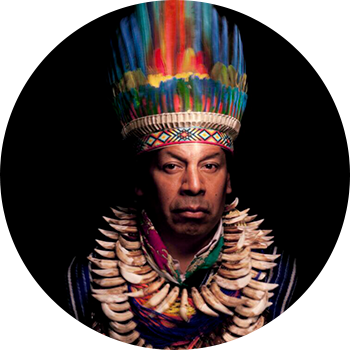
Taita Juan Bautista Agreda Chindoy is the current governor of the Kamentsa indigenous community located in the Sibundoy Valley of the Alto Putumayo of Colombia. He is a life-long practitioner of yagé shamanism, who is recognized both within and beyond his native Colombia as a traditional healer and an indigenous authority.
SHORT VIDEOS of SACRED PLANTS I
Find bios above.
Sacred Plant Ayahuasca
Leopardo Yawa Bane, Mamma Senchina and Miguel Evanjuanoy Chindoy
Panel on Peyote: Sacred Plant Medicine
Aukwe García Mijarez, Lisbeth Bonilla, Santos Rentería, Matsiwa de la Cruz Carrillo, Federico Arellano Vazquez
Closing of Sacred Plants Conference
Aukwe García Mijarez, Santos Rentería, Matsiwa de la Cruz Carrillo, Taita Crispin Chindoy, Mamma Senchina, Lila López Sánchez, Laura López, Felipe Fuentes, Don Félix, Miguel Evanjuanoy Chindoy and Leopardo Yawa Bane
INDIVIDUAL INTERVIEWS OF SACRED PLANTS I
Find bios above.
The Rights of Indigenous Peoples and their Cultures
Aukwe García Mijarez
Sacred Plants, Respect and Ancient Traditions
Leopardo Yawa Bane
Sacred Plants and Spirituality
Miguel Evanjuanoy Chindoy
~CULTURAL AND POLITICAL PERSPECTIVES ON PSYCHEDELIC SCIENCE~
Cultural Perspectives on Psychedelic Science
August 18, 2018
Aukwe García Mijarez

Aukwe García Mijarez is from the Wixárika community of Tatei Kie, San Andrés Cohamiata, Jalisco, Aukwe (in Wixárika means Magnolia). She studied at the Instituto Tecnológico y de Estudios Superiores de Occidente (ITESO) and graduated with a degree in Communication Sciences in 2016.
~SACRED PLANTS FORUM: USES AND NORMS~
November 21-22, 2018
The Defense of Wirikuta and the Traditional Use of Hikuri
November 21, 2018
Aukwe García Mijarez

Aukwe García Mijarez es de la comunidad Wixárika de Tatei Kie, San Andrés Cohamiata, Jalisco, Aukwe (en Wixárika significa Magnolia). Estudió en el Instituto Tecnológico y de Estudios Superiores de Occidente (ITESO) y se graduó como Licenciada en Ciencias de la Comunicación en el 2016. Actualmente trabaja como Coordinadora de la Mesa de Comunicación del Consejo Regional Wixárika y es colaboradora en el Programa de Radio “Territorios” de la Universidad de Guadalajara.
Is the Hikuri over? Wixáritaari Perspectives on Peyote Status
November 21, 2018
Lisbeth Bonilla
Para los wixáritaari el hikuri (peyote) es una planta sagrada que hemos venido usando desde tiempos inmemorables, a través de esta flor podemos comunicarnos con los dioses y el kauyumari (el venado, Nuestro Hermano Mayor). Por ello, cada dos años realizamos peregrinaciones a Wirikuta para la recolecta tanto para nosotros y para la comunidad. Desde mi experiencia en el peregrinaje de acompañar en dos ocasiones al grupo del centro ceremonial donde pertenezco de la comunidad de San Andrés Cohamiata, Jal; comparto mi perspectiva como joven wixárika sobre la situación actual del hikuri, y las opiniones de los mayores sobre este tema. Los wixáritaari nos preguntamos, ¿se está acabando el hikuri?, desde el mundo wixárika ¿es posible que ocurra? ¿Qué será de nosotros sin hikuri?

Lisbeth Bonilla’s name in the Wixárika language is Kupuri, which means Sacred Water. She comes from the community of Tateikié in San Andrés Cohamiata, Jalisco. She left her place of origin at the age of seventeen to get a degree in Administration at ITESO, the Jesuit University of Guadalajara, to gain expertise in the area of income-generating projects in order to build the local economy. Even from afar, she has maintained a close bond with her people, both in her professional life and as a Wixárika community member. In the city, she has been in constant contact with other Wixáritari who have settled in the Guadalajara metropolitan region. There, Wixárika women have further strengthened their community bonds through organized sports. On her mother’s side, she descends from a traditional family line, allowing her to participate in cultural activities at Tateikié, the ceremonial center of Tunuwame. She has had the privilege of accompanying pilgrims or jicareros from this center on two pilgrimages to Wirikuta, the sacred peyote desert. As a young Wixárika, she has observed the growing pace of globalization and influence of capitalism among her people, for better or worse. In this context, she plans to practice her career while continuing on the path of family traditions. She believes that the experience of being immersed in two different cultures makes education a vital tool for being Wixárika in the 21st century.
The Story of María Sabina Told By the Archives of Renato García Dorantes
November 21, 2018
Inti García Flores

Inti García Flores es mazateco de Huautla de Jiménez, investigador de la cultura mazateca y licenciado en Historia, maestro de escuelas secundarias de la región. Es hijo de Renato García Dorantes quien, en vida, realizó investigaciones y publicaciones de la mazateca. En el año 2012 colaboró en un proyecto de catalogación para rescatar el archivo de la familia. Realizó un catálogo crítico y realizó la digitalización del acervo fotográfico para la consulta pública dentro de la comunidad. También ha participado como conferencista en el coloquio “Seis acercamientos a la región mazateca,” en el museo Nacional de Antropología e Historia de la ciudad de México. Actualmente pertenece al Grupo de Archivistas Audiovisuales de Oaxaca y resguarda el Archivo Histórico Renato García Dorantes, el cual conserva las investigaciones realizadas por su padre; dicho acervo se compone de: documentos, libros, audios, videos en distintos formatos y foto fija.
Short Video from Sacred Plants Forum: Uses and Norms
Sacred Plants: Law and Conservation
November 21-22, 2018
Aukwe García Mijarez, Lisbeth Bonilla, and Inti García Flores (bios above)
~QUEERING PSYCHEDELICS~
June 1-2, 2019
Queering the Landscape: Indigenous Perspectives on the Spiritual Ecology of Kinship, Land, and Responsibility
June 1, 2019
Kanyon Sayers-Roods
I am from the Indian Canyon band of Mutsun-Ohlone peoples and I am a spokesperson for the Association of Ramaytush Ohlone people, the lineal descendants of Yelamu (now San Francisco), the original people before contact. I offer an opening song and reminder of the importance of land acknowledgments and inclusion of Indigenous peoples in regard to decisions impacting our communities, the environment, and our future. I offer an Indigenous, two-spirit perspective on the ecology of the land we stand on. As stewards of the land, we have a responsibility to our environment, always thinking ahead seven generations. I will talk about traditional ecological knowledge and respect for the plants and their abilities and the importance of recognizing native communities and seeking their blessing. The focus of my work is on offering opportunities to share Indigenous perspectives and making a difference in the lives of others by sharing my life experiences and knowledge about California’s Native Americans, today’s common practices, and sacred site protections.
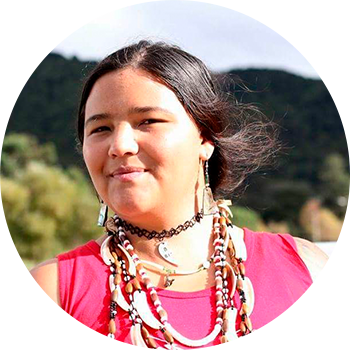
Kanyon Sayers-Roods is Costanoan Ohlone-Mutsun and Chumash; she also goes by her given Native name, “Coyote Woman.” She is proud of her heritage and her native name (though it comes with its own back story), and is very active in the Native Community. She is an Artist, Poet, Published Author, Activist, Student and Teacher. The daughter of Ann-Marie Sayers, she was raised in Indian Canyon, trust land of her family, which currently is one of the few spaces in Central California available for the Indigenous community for ceremony. Kanyon’s art has been featured at the De Young Museum, The Somarts Gallery, Gathering Tribes, Snag Magazine, and numerous Powwows and Indigenous Gatherings. She is a recent graduate of the Art Institute of California, Sunnyvale, obtaining her Associate and Bachelor of Science degrees in Web Design and Interactive Media. She is motivated to learn, teach, start conversations around decolonization and reindigenization, permaculture and to continue doing what she loves, Art. Kanyon is also the Founder of Indian Canyon Two-Spirit Society, Cultural Director and COO of Costanoan Indian Research and Cultural Representative and Native Monitor for Indian Canyon Mutsun Band of Costanoan Ohlone People.
~PSYCHEDELIC LIBERTY SUMMIT~
April 25-26, 2020
Opening Remarks
April 25, 2020
Taita Juan, Celina De Leon, Josh Meadow, and Bia Labate

Taita Juan Bautista Agreda Chindoy is the current governor of the Kamentsa indigenous community located in the Sibundoy Valley of the Alto Putumayo of Colombia. He is a life-long practitioner of yagé shamanism, who is recognized both within and beyond his native Colombia as a traditional healer and an indigenous authority.
How is Malpractice and Commercialization of Yagé Hindering Indigenous peoples’ defense of the Amazon Rainforest and their Cultural Resistance?
April 26, 2020
Miguel Evanjuanoy and Riccardo Vitale
Elderly sages from the Amazon rainforest are saying that yagé (ayahuasca) medicine can only be practiced by Indigenous people taught within their own traditions. How should the psychedelic movement and civil society respond to this demand? In November 2019, seven organizations representing Indigenous people from nine Amazonian countries signed a statement denouncing the commercialization and malpractices of ayahuasca medicine. According to this document, traditional Indigenous property and practices are being, once more, usurped, trivialized, packaged, and sold for the sake of Western markets. The document also states that the consequences of this are dire for both Indigenous people and consumers alike. The purpose of this breakout session is to discuss perspectives of cultural appropriation, starting from the point of view of Indigenous communities for whom yagé/ayahuasca is an important cultural practice connected to the defense of their territories, peacebuilding, and social reconstruction

Miguel Evanjuanoy Chindoy, environmental engineer, member of the Inga people, community leader and follower of yagé spirituality since his childhood years. He lives in Putumayo, Colombia. Miguel is an indigenous rights’ activist and a spokesperson for the Union of Indigenous Yage Medics of the Colombian Amazon (UMIYAC). His work includes building bridges between knowledge systems to strengthen the territorial and political autonomy of Amazonian indigenous peoples. He also focuses on key issues such as: the role that indigenous spirituality and yagé medicine play in indigenous governance, indigenous mental health, peacebuilding and reconciliation in war-torn Colombia. Recently he has been researching and raising conscience about the devastating effects of cultural appropriation of spiritual practices on Amazonian communities. He leads UMIYAC’s technical committee.
What do Native American Women Voices Have to Tell Us about Peyote and Traditional Plant Medicine Ceremonies?
April 26, 2020
Dawn Davis, Christine Diindiisi McCleave, Wahleah Johns, and Belinda Eriacho
This breakout session delved into personal accounts and history of medicinal use of peyote and other traditional plant medicines used by various North American Tribes from the perspectives of Native American women. The feminine beauty we carry is our sacred responsibility and communicated in our discussion on the plant medicines, the connection to our ceremonies, the importance of recognizing the political battles of our Native communities in fighting for ceremonial rights, and why Native American inclusion on plant medicines and ceremonial topics is critical. As Indigenous plant medicines are becoming more mainstream, we feel it is important to discuss and share some questions such as: How are our ceremonies misunderstood? What are our concerns for ethical use? What are the appropriation and the spiritual dangers for misuse of sacred plants? What are the impacts to Indigenous communities for access, cultivation, policy, federal law, decriminalization, and harvesting rituals by the increased interests of Westerners?

Dawn D. Davis is a mother, a wife, and a PhD student at the University of Idaho in the Natural Resources program. Her current research uses GIS as one tool to analyze the environmental and anthropogenic issues that surround the revered peyote (Lophophora williamsii) plant, which is integral to her spiritual practice as a Shoshone-Bannock Tribal woman. She is a twice awarded National Science Foundation recipient as a fellow under the Integrative Graduate Education Research Traineeship and as an Indigenous Science Technology Engineering and Math scholar. Dawn has shared her research among Native American, academic, ethnobotanical, and psychedelic audiences nationally and internationally. Dawn is also Co-Editor for the Journal of Native Sciences and a Founding Director with Source Research Foundation.
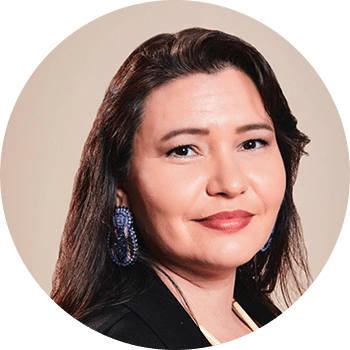
Christine Diindiisi McCleave, enrolled citizen of Turtle Mountain Ojibwe Nation, is Executive Director for the National Native American Boarding School Healing Coalition. McCleave was the Coalition’s first employee and has grown the organization since 2015. McCleave’s grandfather attended Marty Catholic Indian Boarding School in SD and Haskell Indian Boarding School in Kansas and her great grandfather attended Carlisle Indian School where he played football with Jim Thorpe. Boarding school’s inter-generational impacts on her personal life and children’s lives led McCleave to complete her Master of Arts in Leadership thesis on the spectrum of spiritual practices between traditional Native American spirituality and Christianity. Her research examined the legacy of Indian boarding schools on spiritual activities today, including peyote ceremony in the Native American Church, historical trauma, indigenous rights, and Indian activism today. McCleave also has a Bachelor of Science in Communication Studies from Northwestern College. She lives in Minneapolis, MN with her family.
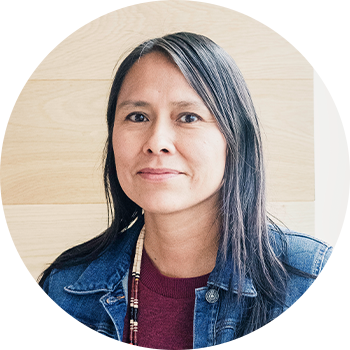
Wahleah Johns is a member of the Navajo (Dine) tribe and comes from the community of Forest Lake, Arizona.

Belinda Eriacho is from the Diné (Navajo) and Ashwii (Zuni Pueblo) lineages. Her maternal clan is “One-Walks-Around” and she is born for the Zuni people. Belinda was born and raised on the Navajo reservation in Arizona. She holds degrees in Health Sciences, Public Health, and Technology. Belinda participated in the MDMA Therapy Training for Communities of Color in August, 2018. Belinda has journeyed through her own inner and physical healing to find her gifts as a Healer and Wisdom Keeper.
Habitat Loss, Decriminalization, Conservation and Legalization Frameworks of Peyote
April 26, 2020
Dawn D. Davis
The peyote cactus [Lophophora williamsii], which is ingested for its medicinal qualities, has been a conservation concern for peyotists and members of the Native American Church (NAC) since 1976. Since 2009, the International Union for the Conservation of Nature has identified peyote as a vulnerable species across its range within the United States and Mexico. The primary threat to long-term conservation is overharvesting due to increased demands by members of the NAC, in addition to improper harvesting techniques of peyote distributors, and large-scale land conversion. This presentation includes not only an examination of the spatial distribution of peyote as it relates to course scale fragmentation of habitat; it will also discuss the intersection of decriminalization, legalization, and conservation. Inclusion of an Indigenous ecological perspective in these conversations allows for intertribal and community-based conservation, co-management, and enactment of sacred ecology. It is important that peyote, as it relates to a bona fide religion recognized by the Supreme Court of the United States, is acknowledged and afforded respect.

Dawn D. Davis is a mother, a wife, and a PhD student at the University of Idaho in the Natural Resources program. Her current research uses GIS as one tool to analyze the environmental and anthropogenic issues that surround the revered peyote (Lophophora williamsii) plant, which is integral to her spiritual practice as a Shoshone-Bannock Tribal woman. She is a twice awarded National Science Foundation recipient as a fellow under the Integrative Graduate Education Research Traineeship and as an Indigenous Science Technology Engineering and Math scholar. Dawn has shared her research among Native American, academic, ethnobotanical, and psychedelic audiences nationally and internationally. Dawn is also Co-Editor for the Journal of Native Sciences and a Founding Director with Source Research Foundation.
Sacred Peyote Conservation
April 25, 2020
Sandor Iron Rope
I explored how society can honor and respect the Indigenous peyote way of life and this particular medicine in the context of legal, political, and cultural shifts of today. The presentation focused on exploring peyote conservation issues from an Indigenous Native American Church perspective. This sacred plant is at the center of a way of life that has a particular place and role on this continent. As Indigenous Tribes continue on the quest of preservation of their culture, sacred land, and social sovereignty, modern developments continue to establish themselves in this world, so too does Indigenous plant sovereignty wish to thrive.
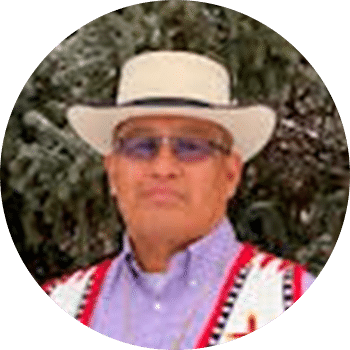
Sandor Iron Rope is Oglala Lakota Oyate from Pine Ridge South Dakota. Mr. Iron Rope received his B.A. in Human Services and American Indian Studies from the Black Hills State University. He serves as President of the NAC of South Dakota and former chair of NAC of North America. He is also the executive director of ‘TTO’, a non-profit committed to peyote conservation and the preservation of Lakota Culture and Health. He is a member of the Board of Directors of the Indigenous Peyote Conservation Initiative.
What Are Indigenous Concerns about the Globalization of Ayahuasca?
April 25, 2020
Daiara Tukano
This breakout session reviewed diverse Indigenous views and concerns about the globalization of ayahuasca and asked for open and respectful hearing and discussion. Since 1630, when the Yepá Mahsã people, better known as the Tukano, made contact with the Portuguese, the medicinal plant kahpi, classified as Banisteriopsis caapi by Richard Spruce in 1851, has passed from demonization to globalization. Today we Indigenous peoples who know and practice the uses and knowledge of ayahuasca are a minority compared to its global consumption. The Indigenous ayahuasca conferences held in Brazil over the last three years have brought together numerous Indigenous spiritual leaders to debate strategies to protect and strengthen the cultural heritage of each people, manage the planting of medicines, guarantee the right to ceremonial practices, combat the criminalization of ayahuasca and shamans, and address the growing concern with good use of the medicines and with the “economy” that has sprung up around them – both in the countries where ayahuasca is legal and where it is illegal. This breakout session discussed the paradox of the globalization of ayahuasca, as it simultaneously represents major opportunities and threats to Indigenous peoples. Several questions emerge for discussion: How can we mediate the different paradigm conflicts that are emerging around the globalization of Ayahuasca? How can we ensure respect for the rights of the peoples who represent the original custodians of the medicine? Is it possible to form supportive alliances and if so, how?
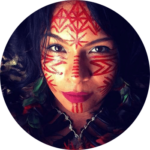
Daiara Tukano – Duhigô is a member of of the Yé’pá Mahsã Tukano indigenous people of the Alto Rio Negro in the Brazilian Amazon. She was born in São Paulo, Brazil. She is an artist, activist, educator, and communicator. She holds a master’s in human rights from the University of Brasília – UnB, and is a researcher on the right to the memory and truth of indigenous peoples. She is Coordinator of Radio Yandê, the first indigenous web-radio in Brazil: www.radioyande.com. She studies the culture, history, and traditional spirituality of indigenous people and their environment. She currently resides in Brasilia, DF.
~SACRED PLANTS IN THE AMERICAS II~
April 23-25, 2021
Opening Ceremony
Putanny Yawanawa, Claudia Cuentas, Bia Labate, Rick Doblin, Miriam Volat, and Sean McAllister
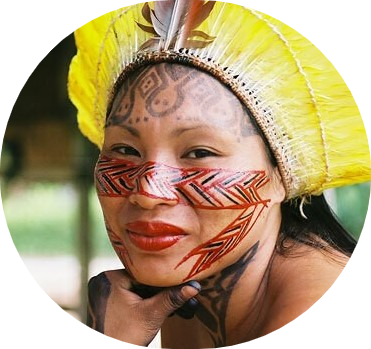
Putanny Yawanawa is the spiritual leader of the Yawanawa people, whose territory is located in the state of Acre, Brazil. Putanny was the first Yawanawa woman to become a shaman, along with her sister Hushahu. In order to face this challenge, she had to overcome men’s prejudice and women’s fears, undergoing a year of spiritual and physical privations so severe that she lost 20 kg of body weight. She is also a great singer of sacred Yawanawá chants. Her courage and determination have opened a path for other indigenous women of different ethnic groups to follow in her steps. Today, inspired by Putanny’s example, young women in her village can be seen singing, dancing, playing instruments, studying medicinal plants, ancestral knowledge and traditional culture.
Towards Plant Assisted Neuro-Decolonization and Reciprocity in Engagements with Indigenous Communities
April 24, 2021
Cash Ahenakew, Vanessa Andreotti, Rene Suša, and Ninawa Huni Kui
Plant medicine practices in the West have mostly been used for personal healing, empowerment or self-actualization. However, in Indigenous settings, these practices have been ancestrally used for mobilizing forms of responsibility and accountability towards the wider planetary metabolism. Such practices can be described as a form of neuro-decolonization that can enable the bio-intelligence of the Earth to rewire our neurophysiology away from unconscious investments in the continuity of capitalism and colonialism. However, for these practices to recalibrate our vital compass towards maturity, sobriety, humility, discernment and accountability, they need to be accompanied by hard teachings that visualize our complicity in systemic harm and that interrupt colonial desires for purity, innocence and individual self-actualization, which are characteristic of spiritual bypassing. This panel introduced the work of The “Teia das 5 Curas” (web of five modes of healing), a network of Indigenous communities from Brazil, Peru, Mexico, and Canada. The network emphasizes the importance of five modes of decolonial healing and transformative justice, which include healing the ways we think (cognitive justice), healing the ways we feel (affective justice), healing the ways we relate (relational justice), healing the ways we exchange (economic justice), and healing the ways we see ourselves as part of the planet’s metabolism (ecological justice). Our collaborations amplify the visibility of Indigenous practices of neuro-decolonization, while drawing attention to common harmful patterns of commodification, extraction and consumption that often characterize engagements with Indigenous communities and their practices. When unacknowledged, these patterns work against developing reciprocal engagements with Indigenous communities.
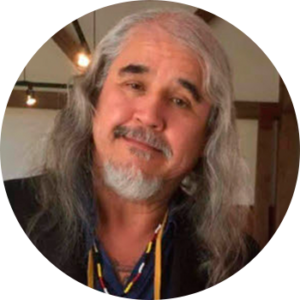
Cash Ahenakew, PhD, is a Canada Research Chair in Indigenous Peoples’ Well-Being and an Associate Professor in the Department of Education at the University of British Columbia. He is Cree and a member of Ahtahkakoop Cree Nation with the ceremonial name pii tai poo taa (flying eagle). His research is based in a commitment to the development of Indigenous theories and mixed methodologies, and addresses the complexities at the interface between Indigenous and non-Indigenous knowledges, education, pedagogy, methodology and ceremony. He is also the author of the book Towards Scarring our Collective Soul Wound. Using the teachings of the Sun Dance ceremony, Towards scarring discusses different sensibilities and understandings of pain and explores Indigenous forms of healing that engage an understanding of our separation from the wider metabolism of which we are part of.
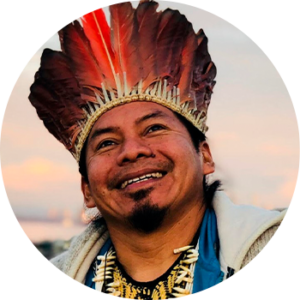
Chief Ninawa Huni Kui is the President of the Federation of the Huni Kui People in Acre, Brazil. He is the spokesperson for nearly 15000 Indigenous people in 104 villages across 12 indigenous territories in the state of Acre, in Brazil. Ninawa is one of the founders of the Huni Kui people’s university of sacred medicine called Ministry of Yurá Baká Nay Bey. He is also a medicine student at the Amazonian University of Pando, in Bolivia.
Psychedelics, Philanthropy and Power in the Emerging Psychedelic Industry
April 24, 2021
David Bronner, Sutton King, Kat Conour, Troy, and David Heldreth
With the arrival of “heroic doses” of capital into what can now veritably be called a “psychedelic industry,” the pivotal role of philanthropic funding is necessarily shifting. Given this isn’t the first time that philanthropic giving has paved the way for businesses to profit, and in the face of broadening decriminalization, legalization, and medicalization successes, how are the strategies and priorities of philanthropic funders changing? What are the opportunities and challenges when major foundations new to the field add psychedelics as a funding priority? How can for-profits be motivated to share profits? Taking it a step further, in what ways should or could philanthropic and corporate giving embody Indigenous principles like Sacred Reciprocity? This panel explored these and other questions with key philanthropic leaders in the field and officially launched Chacruna’s Indigenous Reciprocity Initiative.

Sutton King, MPH, Afro-Indigenous of the Menominee and Oneida Nation of Wisconsin. She is an Indigenous Health Advocate, Researcher and Social Entrepreneur dedicated to developing and scaling innovative solutions to improve Indigenous health equity across sectors. Her focuses center decolonial approaches and culturally appropriate methodologies within technology, healthcare and business. She supports research to increase the visibility surrounding Indigenous health outcomes and access to mental health care for Urban Natives through her roles as President and Executive Director of the Urban Indigenous Collective a grassroots organization dedicated the health and wellbeing of Urban Natives and Co-Founder of ShockTalk a telebehavioral application connecting Native users to Native therapists. She is the Chief Impact Officer for Journey Colab, a biotech company decolonizing their approach to drug development. In her role as Chief Impact Officer for Journey Colab she supports the design and implementation of a stakeholder model and ensures social impact through company accountability.
Plants Are My Teachers: A story of awakening
April 24, 2021
Mkomose (Dr. Andrew Judge)
I am related to everything. I am the weakest of all my relatives. I have been entrusted with original instruction on how to live a good life. To never take more than I need. To always give back when I take. To prepare for seven future generations. I remember what it means to be a human being. This presentation will share a foundational philosophy learned alongside Indigenous leaders from The Amazon to The Great Lakes, through encounters with sacred plant wisdom. With the rise in popularity of sacred plant wisdom, especially amongst the colonially educated elite, this talk serves as a reminder of our responsibility as humans to our families, communities, environment, and all our relations.
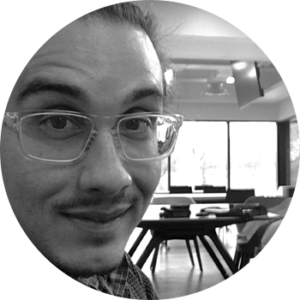
Mkomose (Dr. Andrew Judge) is Assistant Professor of Anishinaabe Studies at Algoma University and Shingwauk Kinoomaage Gamig, and has been sessional Lecturer at Sir Wilfrid Laurier University, The University of Waterloo, and Coordinator of Indigenous studies at Conestoga College. He specializes in Anishinaabe cultural knowledge, ethno-medicine, and land-based learning. Mkomose has learned from, worked and consulted with, and served Indigenous Elders and community leaders for over a decade. He has founded several community led Indigenous based knowledge programs at elementary, secondary, and post-secondary levels and works tirelessly to promote land-based sustainability practices. Mkomose has delivered over 100 invited lectures related to Indigenous knowledge. He is focused on supporting conscious awakening using plant medicines and Anishinaabe cosmovision to respond to the current state of society. He has been initiated into both Midewiwin and Mayan Day Keeping societies and regularly participates in the ancient ceremonial practices of his Anishinaabe ancestors.
Indigenous Bio-Cultural Defense: reclaiming culture, reclaiming fundraising
April 24, 2021
Riccardo Vitale, Miguel Evanjuanoy (Translated by Diana Negrín)
This panel is about perspectives of cultural appropriation and the impact this has on communities in resistance. They discussed how globalization, medicalization and commercialization of ayahuasca practices interfere with transitional justice and hinder biocultural resistance and survival in Indigenous Colombia. Furthermore, they discussed how neo-colonial, re-victimizing, sensationalist fundraising appropriates and exploits the Indigenous image. Lastly, they made a case for new practices of decolonized Indigenous fundraising.

Miguel Evanjuanoy Chindoy is a member of the Inga people from Putumayo, Colombia. He was born in a beautiful hilltop village part of an indigenous territory named Yunguillo, where the local cosmovision and collective work are the pillars of community life. Miguel is a community leader and environmental engineer and has been devote follower of yagé (ayahuasca) medicine since his childhood years. He acts as a spokesperson for the Union of Indigenous Yage Medics of the Colombian Amazon (UMIYAC). Specifically, his work focuses on the role that indigenous spirituality plays in territorial defence and environmental conservation. He is also interested in how yage medicine practiced by local, indigenous traditional healers contributes to peacebuilding, the improvement of community health, and the reconstruction of the social fabric in war torn rural Colombia. Recently Miguel has been speaking internationally about the impact that development models based on extractive economy and on the depletion of earth’s vital resources are having on the Amazonian biocultural ecosystems. On behalf of his organization and community, he is also taking a stand against cultural appropriation and the indiscriminate commercialization of indigenous practices and sacred plants, with the claim that this “marketed spiritualty” is negatively impacting both indigenous peoples and urban users alike.
Capitalism, the State and Sacred Mushrooms in the Sierra Mazateca
April 25, 2021
Osiris Garcia (Translated by Diana Negrín)
My presentation is the result of an analysis that begins from my perspective as a member of the Mazatec people. I described how my community has experienced transformations in our territories and social dynamics over the past century as a result of the advance of capitalism and the formation of the post-revolutionary Mexican state. During this process, the notion of “progress” has served as an ideology to articulate diverse interventions, including public infrastructure projects and the administration of culture. The market for sacred mushrooms emerged in this context, such that the “discovery” by Gordon Wasson of María Sabina’s shamanic knowledge and use of fungi was seen as a mere catalyst of a process that was already underway. The status of Huautla de Jiménez as the region’s economic, political, and cultural capital was only further intensified as it became a center for the commercialization of sacred mushrooms and healing rituals. My presentation seeks to reveal and, at the same time, analyze the problems that resulted from these processes. Of particular concern is the growing scarcity of sacred mushrooms as a result of the disruption and human exploitation of natural spaces, the demand by different tourist segments, as well as local struggles for the administration of the cultural market. Faced with this situation, it is essential that sacrality and memory resist the intrusions of capitalism.

Osiris García Cerqueda, a historian, is originally from Barrio de la Cruz community in Huautla de Jiménez, Oaxaca. He is currently enrolled in the doctoral program in sociology at the Institute of Social Sciences and Humanities “Alfonso Vélez Pliego” of the Benemérita Universidad Autónoma de Puebla. His research focuses on the history of the Mazatec people of the Oaxaca highlands, as well as reconfigurations in their practices surrounding the consumption of sacred mushrooms.
Wixárika Perspectives on Peyote Politics
April 25, 2021
Lisbeth Bonilla, Diana Negrín, Pedro Nájera Quezada, and Santos Rentería
Peyote has become one of the most debated plants within the world of sacred and psychedelic medicines. Transnational efforts to finance clinical trials, conservation projects, research, and legislative changes have reinforced the need to center the perspectives, concerns and visions of Indigenous peoples who live in the endemic territories. This panel explored the question of peyote use and its conservation from the perspective of Wixárika (Huichol) scholars and representatives in order to help the public better understand the political, ecological, and cultural implications of peyote consumption, as well as the imperative behind its conservation.

Lisbeth Bonilla’s name in the Wixárika language is Kupuri, which means Sacred Water. She comes from the community of Tateikié in San Andrés Cohamiata, Jalisco. She left her place of origin at the age of seventeen to get a degree in Administration at ITESO, the Jesuit University of Guadalajara, to gain expertise in the area of income-generating projects in order to build the local economy. Even from afar, she has maintained a close bond with her people, both in her professional life and as a Wixárika community member. In the city, she has been in constant contact with other Wixáritari who have settled in the Guadalajara metropolitan region. There, Wixárika women have further strengthened their community bonds through organized sports. On her mother’s side, she descends from a traditional family line, allowing her to participate in cultural activities at Tateikié, the ceremonial center of Tunuwame. She has had the privilege of accompanying pilgrims or jicareros from this center on two pilgrimages to Wirikuta, the sacred peyote desert. As a young Wixárika, she has observed the growing pace of globalization and influence of capitalism among her people, for better or worse. In this context, she plans to practice her career while continuing on the path of family traditions. She believes that the experience of being immersed in two different cultures makes education a vital tool for being Wixárika in the 21st century.

J. Santos Rentería Carrillo es Abogado Wixarika, de la comunidad de Paso de Alica, del Nayar, Nayarit, Mexico. Egresado de la Universidad del Alica, con Maestría en Ciencias Administrativas de la Universidad Autónoma de Nayarit, así como Licenciado en Educación Indígena de la Universidad Pedagógica Nacional. Es miembro Fundador de la Unión de Profesionistas Indígenas de Nayarit A.C. Ha laborado en distintas áreas gubernamentales en materia de Procuración e impartición de Justicia, así como de asesoría legal. En el ámbito profesional, ha participado en foros, conferencias, seminarios sobre temas de Derechos Indígenas, incursionando en la Defensa de Procesados Indígenas desde la perspectiva de los Derechos Humanos. Ha sido litigante de distintos juicios en materia de Amparo, y de protección de los derechos políticos electorales de indígenas en Nayarit. Actualmente es miembro del Poder Judicial de la Federación, con especialidad Operador de Justicia.
A Grandmother’s Prayer – Indigenous Peyote Conservation and Keeping what is Sacred, Sacred
April 25, 2021
Lucy Benally and Miriam Volat
It’s 2021, and our world continues to change, and quickly. Indigenous people are still here in North America, despite the last 350 years of history. Peyote, a sacred indigenous medicine of North America, is still here too, offering physical, emotional, psychological, and spiritual healing; offering cultural and identity reconnection for Indigenous peoples of this land. Our medicine is however threatened in its natural habitat. Lucy, Azee Bee Nagaha of Dine Nation youth program coordinator and grandmother of three, shared what the Indigenous Peyote Conservation Initiative plans for biocultural restoration of peyote way of life, the peyote populations, why this is so important to support in native communities and by other folks as well, and how today’s cultural activities and conservation efforts in the peyote gardens and at home are a prayer for a sacred future. Miriam, Co Director of Riverstyx Foundation and IPCI interim Director and coordinator of the Indigenous Medicine Conservation Fund, shared what it means to be an ally of Indigenous Medicine Communities and put herself and her work behind biocultural conservation for peyote and other medicines, their lands, people, cultures and future.
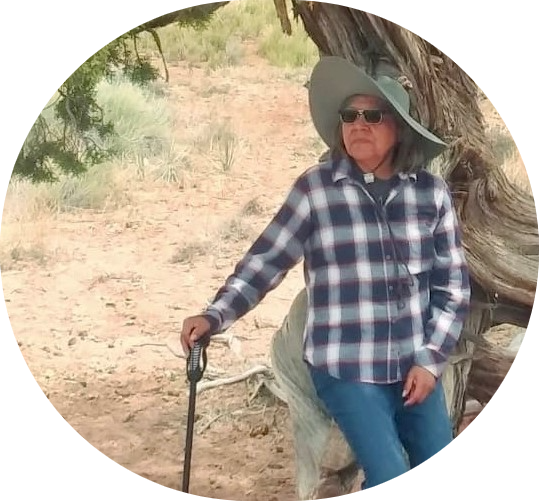
My name is Lucy Ann Benally, MA. Ed from Sweet Water, Az on the Navajo Nation. A retired teacher after 30 years. As a Dine, we formally introduce ourselves with our four clans. My maternal clan is Edgewater, my paternal clan is the Salt clan. My maternal grandfather’s clan is Red a running into the water & my paternal grandfather’s clan is Folded Arms. These are my lineage by which I have relationships with my Dine(Navajo) people. I’m a mother of three children, a grandmother of three grandchildren and the spouse of Steven Benally for 43 years. I’m currently serving on the ABNDN, Azee’ Beenahaghah of Dine Nation Youth Committee with a number of Educators from different parts of the Reservation. Our mission for this Committee is to reconnect our Youth to our Azee’(peyote), healing medicine through presentations and direct hands-on experience on our newly acquired land in TX. The ultimate goal is to retain the Peyote way of life for our children so it will sustain them in the future. The goal and mission of the ABNDN Youth Committee and Indigenous Peyote Conservation Initiatives are aligned and becoming a reality due to many people’s efforts and it has been an honor to be a participant.
Beyond Oneness: A Two-Spirit Approach to Social Construction, Social Justice and Psychedelics
April 25, 2021
Marca Cassity and Katherine A. Costello
Marca shared their personal journey in the psychedelic community as a two-spirit member of the Osage Nation and as a therapist specializing in queer and Native American-related trauma. They draw attention to the fact that two-spirit people have their own specific kind of trauma, how psychedelics can heal this trauma, and offered practical suggestions about how the psychedelic community can help ensure access to and facilitate such healing. Marca and Katherine then folded this perspective into the larger framework of the conversation currently happening around identity politics and psychedelics. In the United States, efforts to ensure equity and access for marginalized communities have been consistently met with resistance from a portion of the psychedelic community that argues that taking into consideration race, gender, sexuality, and other vectors of difference is antithetical to one of the key insights of psychedelic healing—oneness. We show that this argument conflates oneness with sameness and drawing on our radically different experiences show that even though identity markers are indeed socially constructed, they nonetheless have very real material consequences on people’s lives and that refusing to address these in the name of oneness is a form of spiritual bypassing. We then put forth an understanding of oneness that is not in opposition to difference but in fact inextricably connected to it.
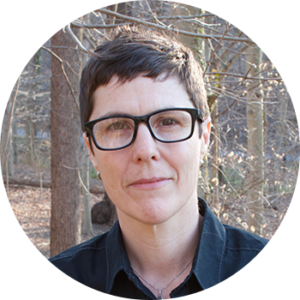
Marca Cassity has over twenty years of experience in the healing arts, working with renowned therapists, spiritual teachers, artists, academics, and medicine people from around the world. After completing a BSN at the University of Oklahoma and working as an emergency room nurse for several years, their journey as a therapist began overcoming their own trauma and cultivating resilience as a two spirit, queer, mixed-race Native American who grew up on the Osage reservation of Oklahoma. In addition to a depth of personal work, and study of trauma-focused therapies, Marca has found healing in Peyote ceremony of the Native American Church, and for the last eighteen years has been deeply involved with ayahuasca healing and integration work. Their clinical training was at the Native American Health Center of San Francisco, with additional training at the Indian Country Child Trauma Center at the University of Oklahoma studying under Dr. Dolores Bigfoot. A critically acclaimed songwriter Marca delivers inspired folk rock spirit songs with Native nuances, that speak to overcoming hardship through resilience, in connection to nature, humor, love, compassion, spirituality, and heritage. Marca works as a therapist in private practice in Portland, Oregon. They sit on the advisory board on diversity for the Multidisciplinary Association of Psychedelic Studies (MAPS), and are completing training in MDMA assisted therapy.
The Ongoing Globalization of Ayahuasca: an Indigenous Perspective
April 25, 2021
Leopardo Yawa Bane (translated by Pedro Von Tol)
I am a representative of the Kaxinawá (Cashinahua) Indians from the state of Acre in Brazil. Traditional Brazilian indigenous communities such as mine have used ayahuasca as a medicinal plant since time immemorial. Today, the use of ayahuasca is spreading to the Western world. Recently, a large number of Indigenous people have traveled the world, especially in Europe, where they present their culture, offer shamanic rituals and spread the use of ayahuasca to bring healing to the West. Many shamanic groups and healers have emerged, spreading the use of ayahuasca to urban areas of large cities. I, myself, have been traveling the world for several years. I feel privileged by the experiences I have had, which until recently would have been impossible for me. As a child, not even in my wildest dreams could I imagine that I would travel the world and teach people about my culture and tribal traditions. While the global spread of ayahuasca and indigenous culture is something that I support, and that has brought me joy and many opportunities, there are some things that concern me. My main worry is that my people and our culture will be forgotten as more and more Westerners are introduced to ayahuasca in foreign contexts. Its original meaning and guardians may be lost. I believe that the problem with ayahuasca is, in essence, a human rights issue: as an Indigenous representative from the Amazon forest, I want to speak to you about my views of the ongoing globalization of ayahuasca, and how we might move forward together on this issue.
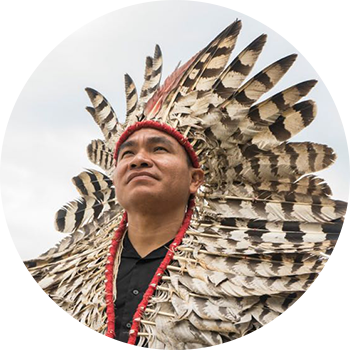
Leopardo Yawa Bane is the son of a traditional chief of the Huni Kuin (an indigenous group also known as the Cashinahua). Leopard Yawa Bane is an international and national advocate of the preserving the ecological heritage of the native lands of his people. Born in the Cashinahua Reserve of the Jordan River in the State of Acre, Brazil, Bane and his brother Fabiano were sent from the villages to Brazilian cities at a young age by their father and chief, in order to learn new knowledge of the world outside the forest and to represent their people in tradition, heritage, and politics. Since then, Bane has completed his university studies, learning to speak Portuguese fluently, and has begun to represent his people nationally and internationally as an ambassador and healer. Bane and his people see the mystical and natural duality of the plants and how the spiritual world can be accessed through the plants found in their native areas. As is common with indigenous tribes around the world, and particularly in the Amazon, the Huni Kuin have a unique worldview, from creation to the beyond, derived from the wisdom of plants and their shared history. Bane grew up using and being trained in the use of medicinal plants by his grandfather. Fifteen years ago, he started using different medicinal plants with non-indigenous people. Bane brings the knowledge of his ancestors, of his people, and of the forest.
Sacred Medicines, Music and Indigenous Spirituality Among the Yawanawa People
April 25, 2021
Biraci Brasil (Translated by Pedro von Tol)
The Yawanawa Indigenous people, who inhabit the Rio Gregório region in the Amazon rainforest, are a major force in the Global South when it comes to Indigenous uses of ayahuasca and sacred plants. Known also for their musicality, their powerful female leaders, their international festivals, and sacred use of medicines from the forest, the Yawanawa are a shining example of the cultural strength and artistic wealth of Indigenous nations in South America. This talk covered the use of sacred medicines such as tobacco snuff, ayahuasca (uni), sananga, and muká by the Yawanawa, as well as characteristic elements of their traditional music, which is much appreciated in Brazilian ayahuasca circles. The talk also reflected on aspects of ancestral spirituality and the alliances established between the Yawanawa and non-Indigenous people around the world. In addition, historical aspects of the Yawanawa people’s struggle for autonomy and recuperation of ancestral traditions were also addressed.
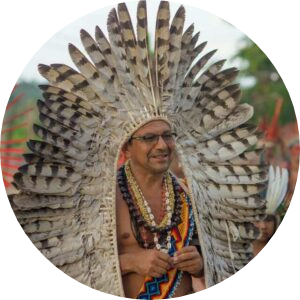
Biracir Brasil is one of the Amazon’s leading indigenous leaders. While living in Rio Branco, the capital of the state of Acre, Brazil in the early 1990s, he was called on by Yawanawa elders to take over the leadership of his people. Returning to his village, Bira initiated a revolution of cultural revival in the Yawanawa community. He expelled aggressive New Tribes evangelical missionaries, instituted the teaching of the native language and encouraged the study of ancient myths and stories as a way of reconnecting younger generations with the knowledge and memories of the ancestors. He also relocated the main village to a hill on the banks of the Gregório river, with a good view of river traffic, in order to better control access to the reserve which was demarcated in 1987. Twenty fiver years later, the Yawanawás are now a major cultural force and international example of how indigenous nations can assert control of their lands and achieve valorization of their cosmopolitics and traditional culture.
The Medicalization of Ayahuasca: Promises, Challenges, and Reciprocity
April 25, 2021
Miguel Evanjuanoy Chindoy, Daiara Tukano, Joe Tafur, Leanna Standish, and Victoria Hale
In the last couple of decades, the popularization of ayahuasca and other psychedelic plant medicines has exponentially expanded their reach and their significance, well beyond the localized — yet multivocal— popular uses of Indigenous and traditional people, and into leading research and medical institutes in the Global North. As these plant medicines make their way out of the jungle and into worldwide cities, their uses, meanings, and articulations change to conform and adapt to the epistemic, cultural, medical, and political realities of late-capitalist Western societies. This panel focuses on this ongoing medicalization process, through which plants with medical, cosmological, and spiritual significance are being streamlined through the regulatory machinery as potential tools to alleviate the epidemics of loneliness, alienation, anxiety, and depression that plague Western civilization. This is a panel composed of both Western experts at the forefront of, on the one hand, bringing ayahuasca into FDA clinical trials (a quantifiable and homogenized treatment conforming to the demands of Western medical epistemics) and, on the other hand, Indigenous leaders, holders of distinct ways of knowing and being in the world, with perspectives rooted in enchanted cosmologies and the lived experience of centuries of colonial oppression and violence. We discussed the potential benefits and the contradictions inherent in these globalizing and medicalizing processes, what that means for Western patients and for Indigenous groups. Special attention was given to the importance of open access and reciprocity as core values in order to avoid the asymmetric power relations that have marked these fragile intercultural dynamics.

Miguel Evanjuanoy Chindoy is a member of the Inga people from Putumayo, Colombia. He was born in a beautiful hilltop village part of an indigenous territory named Yunguillo, where the local cosmovision and collective work are the pillars of community life. Miguel is a community leader and environmental engineer and has been devote follower of yagé (ayahuasca) medicine since his childhood years. He acts as a spokesperson for the Union of Indigenous Yage Medics of the Colombian Amazon (UMIYAC). Specifically, his work focuses on the role that indigenous spirituality plays in territorial defence and environmental conservation. He is also interested in how yage medicine practiced by local, indigenous traditional healers contributes to peacebuilding, the improvement of community health, and the reconstruction of the social fabric in war torn rural Colombia. Recently Miguel has been speaking internationally about the impact that development models based on extractive economy and on the depletion of earth’s vital resources are having on the Amazonian biocultural ecosystems. On behalf of his organization and community, he is also taking a stand against cultural appropriation and the indiscriminate commercialization of indigenous practices and sacred plants, with the claim that this “marketed spiritualty” is negatively impacting both indigenous peoples and urban users alike.

Daiara Tukano – Duhigô is a member of of the Yé’pá Mahsã Tukano indigenous people of the Alto Rio Negro in the Brazilian Amazon. She was born in São Paulo, Brazil. She is an artist, activist, educator, and communicator. She holds a master’s in human rights from the University of Brasília – UnB, and is a researcher on the right to the memory and truth of indigenous peoples. She is Coordinator of Radio Yandê, the first indigenous web-radio in Brazil. She studies the culture, history, and traditional spirituality of indigenous people and their environment. She currently resides in Brasilia, DF.
Promoting Shipibo-Konibo Knowledge through Cultivating Art and Medicine
April 25, 2021
Diego Villegas Kau, Marcos Urquia Maynas, Eva Melendez (Translated by Katherine Rothschild)
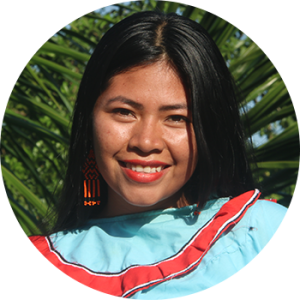
Eva Melendez (Xawan Rabi) is an empowered young Shipibo woman currently studying secondary education at the National University of Ucayali (UNU), and artist with the Kené Néte collective. As winner of the Soi Noma contest in 2019, she became a representative of young Indigenous women, and is currently the vice-president of Alianza Arkana. She participated in the production of the Kené Coloring Book and is an avid creator of Kené.
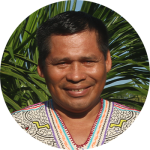
Marcos Urquia Maynas is the current President of Alianza Arkana. He is a Shipibo professional with more than 20 years of experience in forest management and agroforestry in indigenous communities. He combines western practices with the ancestral wisdom he received since childhood. These include the planting and use of medicinal plants. He is the current leader of the Rao Banabo Project (Traditional Medicine Gardens).
~INTERNATIONAL SYMPOSIUM ON PSILOCYBIN~
September 20-21, 2021
Opening Remarks, Mazatec Visionary Art
September 20, 2021
René Alvarado
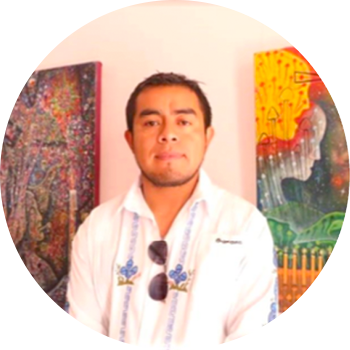
René Alvarado Martínez is a visionary artist from the Sierra Mazateca, Oaxaca, Mexico. Through art he tries to share the ancestral knowledge that revolves around the Sacred Mushrooms, the Mazateca culture and language, highlighting the woman known by nature, the ingestion of the holy children manifested in symbolism that allow us to connect with our inner self, our environment, nature, and God. With 7 years studying and sharing the different species of edible mushrooms, medicinal and entheogenic mushrooms and their function and importance within the ecosystem, he has been a speaker at congresses on sacred plants, and one of his main objectives is to create awareness through art.
Tell Me Again About María Sabina. Historical Considerations on the Capitalization of Culture in the Sierra Mazateca
September 20, 2021
Osiris García Cerqueda

Osiris García Cerqueda is a historian, originally from Barrio de la Cruz community in Huautla de Jiménez, Oaxaca. He is currently enrolled in the doctoral program in sociology at the Institute of Social Sciences and Humanities “Alfonso Vélez Pliego” of the Benemérita Universidad Autónoma de Puebla. His research focuses on the history of the Mazatec people of the Oaxaca highlands, as well as reconfigurations in their practices surrounding the consumption of sacred mushrooms.
Cultural Reflections on the Importance of the Sacred Use of the Little Ones Who Sprout, an Enculturational Perspective
September 21, 2021
Eloy Martínez, Consejo de Planificación Lingüística de la Nación Mazateca (Council for the Linguistic Planning of the Mazatec Nation)
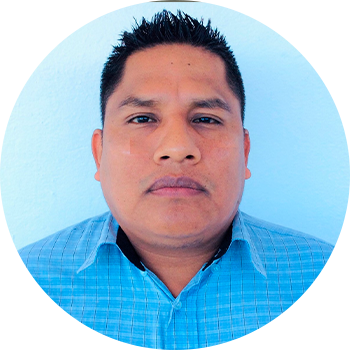
Eloy García García is an independent language promoter and activist. Professor and researcher. He has taught workshops on topics related to the writing of the Mazatec language, as well as topics related to ancestral community knowledge and wisdom. Collaborator with cultural videos on the importance of language, Day of the Dead, medicinal uses of sacred mushrooms, among others. He participated in an AJ+ video where he addressed the importance of the Mazatec whistled language. He collaborates in the elaboration of didactic materials for writing and reading his native Mazatec language, acting as a linguistic advisor in the standardization of its writing.
Recovering the Way of the Ancestors in the Mazatec
September 21, 2021
Heriberto Prado Pereda, Iglesia Autóctona Mazateca
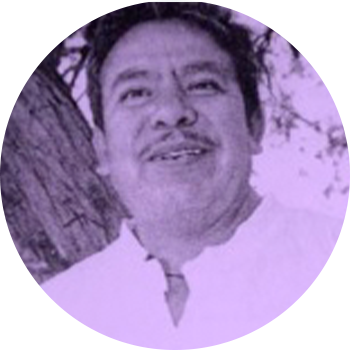
Heriberto Prado Pereda was born in Santa María de Chichotla, in the municipality of Teotitlán de Flores Magón (formerly Teotitlán del Camino), Oaxaca, in 1954. He was a Catholic priest for twelve years; during that time, he translated the mass into Mazatec: kuyNndjale naina nga en na/Cantemos a Dios en nuestra lengua (Mazatec) (Mexico City: ed. Priv., 1986). Since 1997 he has worked as an independent researcher. In 1992-1993 and 1996-1997 he received a scholarship from the Fondo Nacional para la Cultura y las Artes para Escritores en Lenguas Indígenas (National Fund for Culture and the Arts for Writers in Indigenous Languages). As a result, he prepared several volumes of traditional songs and original compositions still unpublished, among them, “Cantos en torno al tiempo santificado indio” (1996). Currently, he is at the head of a coalition of indigenous peoples whose main task is the rescue of the Mazatec cultural heritage, particularly in the religious and cultural field. His work retakes the great religious breath of the traditional Mazatec healers and priests.
~RELIGION AND PSYCHEDELICS CONFERENCE~
April 21-24, 2022
Religion and Psychedelics Forum Opening Event
April 21, 2022
Bia Labate, Clancy Cavnar, Mellody Hayes, Marlena Robbins, Erik Davis, Joe Tafur, Sean McAllister, Michael Ziegler, and Adam Strauss
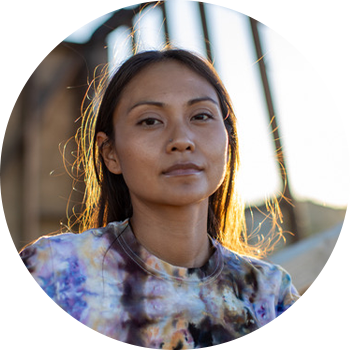
Marlena Robbins Navajo dedicated to building my tribe’s connections with the sacred plant medicines focusing on psilocybin, ayahuasca and peyotzin, because I believe they can be instrumental parts of our healing. My intention is to bridge cultural knowledge of sacred plants with western clinical medicine, specifically in psychotherapeutic settings on tribal reservations. For centuries, our traditional use of sacred plants focused on healing the collective community through ceremony and its integration into our daily lives. The western model of health care has replaced our traditional practices, severing our connections to these sacred medicines. The return of psychedelics to the discussion surrounding mental health offers legal treatments that are only available to those wealthy enough to afford them, inhibiting access for Native population.
Opening Remarks
April 22, 2022
Chief Ninawa Huni Kui

Chief Ninawa Huni Kui is the President of the Federation of the Huni Kui People in Acre, Brazil. He is the spokesperson for nearly 15000 Indigenous people in 104 villages across 12 indigenous territories in the state of Acre, in Brazil. Ninawa is one of the founders of the Huni Kui people’s university of sacred medicine called Ministry of Yurá Baká Nay Bey. He is also a medicine student at the Amazonian University of Pando, in Bolivia.
The Use of Sacred Plants Among Indigenous People in Brazil
April 22, 2022
Simone Takua, Francisco Apurinã, Glenn H. Shepard Jr.
At the dawn of the third decade of the 21st century, the use of plant medicines has become increasingly mainstream in Western society, to the point that many people call this moment a Psychedelic Renaissance. The Indigenous peoples of South America however, have never stopped using plants in their rituals and daily life. Even today they are great guardians of the traditional knowledge associated with plants, whether for physical or spiritual healing, to carry out shamanic journeys, to celebrate the cycles of life or to practice the cosmic diplomacy between human and non-human beings. In this special panel, the traditional uses of plants were addressed by representatives of two native peoples whose territories are located in Brazil: Guarani and Apurinã, bringing a Latin American Indigenous perspective to the event.
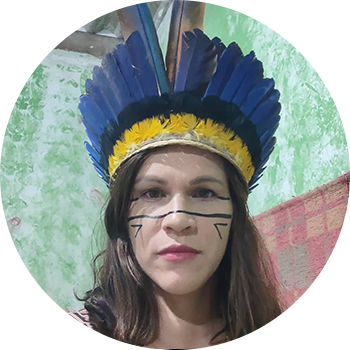
Simone Takua is an Indigenous teacher, artisan and specialist in the traditional use of medicinal plants by the Guarani people and in traditional women’s circles. She was born and raised within the Guarani Mbya culture and lived with the Nambikuara people. She is currently a representative of the Flora Tupi Institute, and lives in Piaçaguera territory.
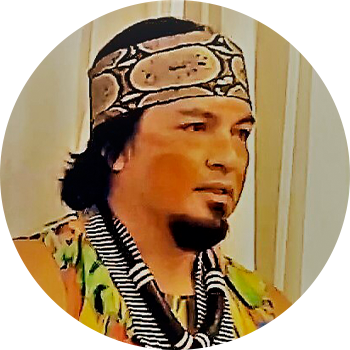
Francisco Apurinã Ywmuniry holds a master’s degree in sustainable development (University of Brasilia), and a PhD in social anthropology (University of Brasil). He is also an environmental educator and president of the Pupykary Institute, an entity made up only of indigenous professionals from the Apurinã people.
Psychedelic, Ancestors and Healing Justice
April 22, 2022
Marlena Robbins, Darren Springer, Jasmine Virdi, and Oriana Mayorga
Do psychedelics and plant medicines represent a technology that allows us to commune with our ancestors? If so, what are the benefits of reconnecting with our ancestry? This panel addressed firsthand experiences and knowledge of psychedelics within traditional African, Latin, and Indigenous cultures. For many BIPOC communities, connecting to their ancestors through the use of psychedelics is an integral part of culture, and can’t be dissociated from identity and territory. Sacred plants traditionally have allowed individuals and communities to connect to their ethnic roots, as well as heal systemic and intergenerational trauma. As such, there are now discussions emerging around the accessibility of these medicines on tribal reservations and in low income communities of color. Locating psychedelics in the realm of the ancestors is also related to the concept of “healing justice”: not only evocative of healing the past, but also healing the present and the future. This speaks to how we, in this present moment, as Indigenous people and non-Indigenous people, can cultivate connections to our own ancestries, heal familial bonds through psychedelics and consciously co-create the future with our youth, being better stewards for future generations.

Marlena Robbins Navajo dedicated to building my tribe’s connections with the sacred plant medicines focusing on psilocybin, ayahuasca and peyotzin, because I believe they can be instrumental parts of our healing. My intention is to bridge cultural knowledge of sacred plants with western clinical medicine, specifically in psychotherapeutic settings on tribal reservations. For centuries, our traditional use of sacred plants focused on healing the collective community through ceremony and its integration into our daily lives. The western model of health care has replaced our traditional practices, severing our connections to these sacred medicines. The return of psychedelics to the discussion surrounding mental health offers legal treatments that are only available to those wealthy enough to afford them, inhibiting access for Native population
~QUEERING PSYCHEDELICS II~
April 21-23, 2023
Notes from the North: Finding Medicine in the Silence
April 22, 2023
Deenaalee Hodgdon (they/them)
During this interdisciplinary interaction, Deenaalee dove into the silence and expression surrounding medicine ways in the North.
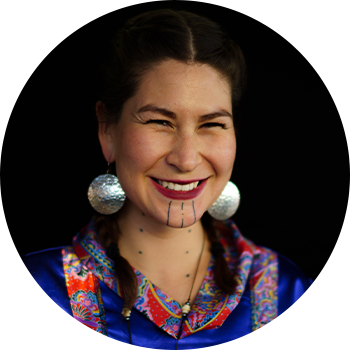
Deenaalee Chase Hodgdon (They/Them) is Deg Xit’an Dene and Yupik/Supiaq from the villages of Gitr’ingithchagg (Anvik) and Qinuyang (South Naknek), Alaska. Descended from rivers and the ocean and named after the great northern mountain, Deenaalee seeks to ground their work in regenerative economies, food sovereignty and security, and circumpolar geopolitics in the lessons these beings teach us; to flow and find grace through the rapids and in the meandering, to find depth, breadth and pleasure in the vastness of our humanity and to hold space for the multiplicity of life we interact with through time while deeply rooted to place. Deenaalee holds their Bachelor’s of Arts Degree in Anthropology with an emphasis in food and fisheries policy, gender and globalization, Indigenous studies, urban design, and entrepreneurship. Since 2016 they have been building relations with psychedelic medicines after being assisted in transforming a partnership into its next form of being. In fall of 2022 they began their journey with Ayahuasca after being called to the jungle to heal intergenerational trauma and addiction. They find their joy in spending time working with their hands mending fishing nets and tanning hides, and feasting in community on traditional foods that were gathered, harvested, and grown locally.
~PSYCHEDELIC SCIENCE 2023~
June 19-23, 2023
Huni Kuin Plants Cultures and Traditions: A Conversation with Yawa Bane
June 21, 2023
Leopardo Yawa Bane
Traditional Indigenous communities from South America have been using many plant medicines, such as ayahuasca (Nixi Pae), as a medicinal plant since time immemorial. In this conversation, Yawa Bane discussed various practices and traditions of the Huni Kuin.

Leopardo Yawa Bane is the son of a traditional chief of the Huni Kuin (an indigenous group also known as the Cashinahua). Leopard Yawa Bane is an international and national advocate of the preserving the ecological heritage of the native lands of his people. Born in the Cashinahua Reserve of the Jordan River in the State of Acre, Brazil, Bane and his brother Fabiano were sent from the villages to Brazilian cities at a young age by their father and chief, in order to learn new knowledge of the world outside the forest and to represent their people in tradition, heritage, and politics. Since then, Bane has completed his university studies, learning to speak Portuguese fluently, and has begun to represent his people nationally and internationally as an ambassador and healer. Bane and his people see the mystical and natural duality of the plants and how the spiritual world can be accessed through the plants found in their native areas. As is common with indigenous tribes around the world, and particularly in the Amazon, the Huni Kuin have a unique worldview, from creation to the beyond, derived from the wisdom of plants and their shared history. Bane grew up using and being trained in the use of medicinal plants by his grandfather. Fifteen years ago, he started using different medicinal plants with non-indigenous people. Bane brings the knowledge of his ancestors, of his people, and of the forest.
Historical and Contemporary Indigenous Rights and Social Justice
June 22, 2023
This session discussed the historical and contemporary perceptions of Indigenous people in the so-called “United States” among the psychedelic movement. They openly discussed, dissected, and debunked misrepresentations of Indigenous people and explored the resilience of Tribal Nations and their members to create healthy socio-ecological systems within their respective families and communities. They explored Indigenous rights and social justice through historical and modern dimensions of colonization on Indigenous systems of life. They discussed how Indigenous peoples strategize and work toward equal access and human rights.

I am dedicated to building my tribe’s connections with the sacred plant medicines focusing on psilocybin, ayahuasca and peyotzin, because I believe they can be instrumental parts of our healing. My intention is to bridge cultural knowledge of sacred plants with western clinical medicine, specifically in psychotherapeutic settings on tribal reservations. For centuries, our traditional use of sacred plants focused on healing the collective community through ceremony and its integration into our daily lives. The western model of health care has replaced our traditional practices, severing our connections to these sacred medicines. The return of psychedelics to the discussion surrounding mental health offers legal treatments that are only available to those wealthy enough to afford them, inhibiting access for Native populations.
Plant Medicine and Reciprocity
June 23, 2023
Marlena Robbins
This talk looked at the use of “reciprocity” in response to the colonial structures of increasingly globalized plant medicine spaces. They addressed issues surrounding disparate participation in the so-called “psychedelic renaissance” between communities in the Global North (GN) and Global South (GS), focusing on Indigenous peoples’ status in a psychedelic ecosystem consisting of diverse stakeholders with different ontological frameworks. The workshop will analyze political, economic, ecological, and cultural relationships to gain a better understanding of what reciprocity means in the current context, taking a biocultural approach in the pursuit of effective advocacy and education. Partnerships between investors in the GN and GS communities often function to recreate and reinforce exploitative dynamics; they discussed the causes and implications of impoverished economic settings where cultural resources are commodified, considering the inherent limitations of capitalist market-based models for access and benefit sharing agreements, whether non profit, corporate, or non-governmental organizations. As psychedelic science grapples with the relational world of diverse beings Indigenous plant medicine refers to, they engage in a modest and mindful exercise to re-think and explore the possibilities of decolonization in the psychedelic space. With this insight, they will begin moving away from cynicism and helplessness towards embodying reciprocity in all their work.

I am dedicated to building my tribe’s connections with the sacred plant medicines focusing on psilocybin, ayahuasca and peyotzin, because I believe they can be instrumental parts of our healing. My intention is to bridge cultural knowledge of sacred plants with western clinical medicine, specifically in psychotherapeutic settings on tribal reservations. For centuries, our traditional use of sacred plants focused on healing the collective community through ceremony and its integration into our daily lives. The western model of health care has replaced our traditional practices, severing our connections to these sacred medicines. The return of psychedelics to the discussion surrounding mental health offers legal treatments that are only available to those wealthy enough to afford them, inhibiting access for Native populations.
A Huni Kuin Perspective on the Globalization of Ayahuasca
June 23, 2023
Leopardo Yawa Bane
I am a representative of the Huni Kuin Indigenous people in the state of Acre. Traditional Brazilian communities have been using ayahuasca (Nixi Pae) as a medicinal plant for thousands of years. Since the creation myths, my people have been using ayahuasca that was received by the creator, Yuxibu. Today, the Huni Kuin continue to hold ceremonies with the sacred. Ayahuasca for my people brings an opening of knowledge, wisdom, and spirituality in our tradition and culture. Ayahuasca brings our consciousness, our awakening about the forest, about the world of cosmology, geometry, and of the Kene and Boa. This path we follow was taught by our grandfathers. The nature of Indigenous peoples is linked to mother earth, the forest, the animals, the creation between heaven and earth, the spirits and spirit world, and to the whole cosmology. Indigenous peoples were the first to use ayahuasca for spiritual purposes, for healing and connections to the forest and nature. However, it has been expanding outside of their villages. Among Indigenous and non-Indigenous people, there has been increasing interest in the culture, customs, and use of ayahuasca. More Indigenous people are traveling around the world, especially in Europe, where they teach about their culture, perform shamanic practices, and expand the use of ayahuasca to the West. A lot of shamanic groups, healers, and shamans have also appeared expanding this use of ayahuasca in the metropolis of big cities. There have been non-Indigenous people going to the villages and bringing Indigenous knowledge to cities in the form of shamanism or holistic and alternative therapies. I myself have been traveling the world for several years and feel privileged by the experiences I have had, which until recently would have been impossible. While expansion of ayahuasca and Indigenous culture is something that I support, there are still many concerns. My main worry is that my people and our culture will be forgotten as more Westerners are introduced to ayahuasca in foreign contexts, and that its original meaning and guardians may be lost. I believe that the problem with ayahuasca is a human rights issue. As an Indigenous representative from the Amazon forest, I want to present my views on the ongoing globalization of ayahuasca and how we might move forward together on this issue. This is all especially relevant after Bolsonaro’s administration which negatively impacted Indigenous peoples, reaffirming a colonial mindset that sees the Amazon forest as a resource to be explored. Indigenous peoples are aware and want a say in the politics of reform. In the case of ayahuasca, this is the main agenda in the discussion of the current drug policy reform.

Leopardo Yawa Bane is the son of a traditional chief of the Huni Kuin (an indigenous group also known as the Cashinahua). Leopard Yawa Bane is an international and national advocate of preserving the ecological heritage of the native lands of his people. Born in the Cashinahua Reserve of the Jordan River in the State of Acre, Brazil, Bane and his brother Fabiano were sent from the villages to Brazilian cities at a young age by their father and chief, in order to learn new knowledge of the world outside the forest and to represent their people in tradition, heritage, and politics. Since then, Bane has completed his university studies, learning to speak Portuguese fluently, and has begun to represent his people nationally and internationally as an ambassador and healer. Bane and his people see the mystical and natural duality of the plants and how the spiritual world can be accessed through the plants found in their native areas. As is common with indigenous tribes around the world, and particularly in the Amazon, the Huni Kuin have a unique worldview, from creation to the beyond, derived from the wisdom of plants and their shared history. Bane grew up using and being trained in the use of medicinal plants by his grandfather. Fifteen years ago, he started using different medicinal plants with non-indigenous people. Bane brings the knowledge of his ancestors, of his people, and of the forest.
IV. INDIGENOUS VOICES
We have created a section in the Chacruna Chronicles to highlight articles written by or including Indigenous people and communities. These range from interviews with Indigenous people, Native American statements regarding legal policies, statements on Indigenous conferences, and much more.


